#man i really need to reread the series i can hardly remember a lot of the characters
Note
Annabeth= Claire, Jimmy novak= fredrick chase, dean= apollo (but also sally? And nico??) John= Zeus, Bobby= hades cannot for the elite of me figure out sam (cas is percy but like heroes of Olympus percy not pjo one)
claire: annabeth-coded
jimmy: kind of frederick-coded but not really
dean: honestly he’s too fucked up for anyone in pjo. hylla-coded maybe?
cas: frederick-coded
john: every terrible parent in the entire series-coded
bobby: reyna-coded
sam: i’m also not sure? possibly thalia-coded?
#man i really need to reread the series i can hardly remember a lot of the characters#ask#pjonatural
4 notes
·
View notes
Text
BnHA Chapter 308: VIBE: CHECKED
Previously on BnHA: Lots and lots of Shindou idk what else to tell you.
Today on BnHA: Tired Nomad Deku rescues Shindou from Muscular, and us from Shindou. Muscular is all “OH BOY I SURE CAN’T WAIT TO FIGHT DEKU AGAIN AFTER HE TOTALLY KICKED MY ASS THE LAST TIME!! I’M SURE THIS TIME WILL GO DIFFERENTLY SEEING AS HE’S HAD ALMOST AN ENTIRE YEAR’S WORTH OF ADDITIONAL TRAINING, AND ALSO HAS SIX FOURQUIRKS NOW, IN ADDITION TO THE CONFIDENCE THAT COMES WITH HAVING EIGHT OTHER PEOPLE’S SOULS CHILLING OUT INSIDE HIM OFFERING MORAL SUPPORT AND ENCOURAGEMENT.” Deku is all, “[kicks Muscular’s ass effortlessly].” Muscular is all, “[gets his ass totally kicked].” I for one am very satisfied with this, and with respect to all, I would like to hereby declare this post a discourse-free zone. I’m just happy to see my son out here making good use of his FOURQUIRKS, and more importantly beating Muscular in less than seventeen pages so we can all go on with our lives lol.
damn Deku since when were you allowed to look this cool
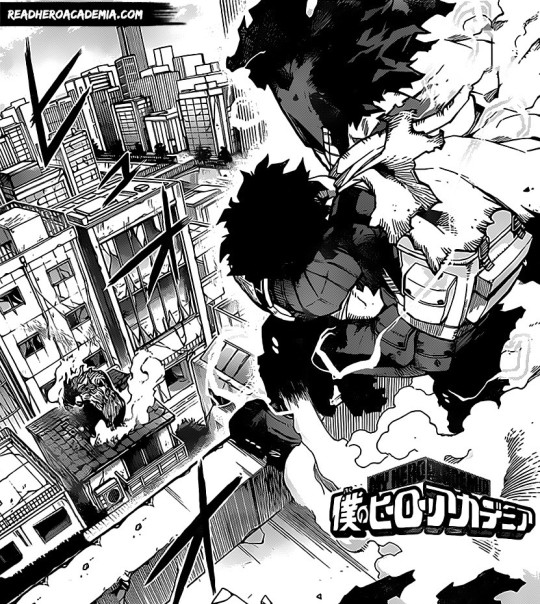
from this perspective and with the smoke, cape, backpack, and mask more or less obscuring his actual profile, he looks less like a sixteen-year-old boy and more like a grownass man
OH SNAP
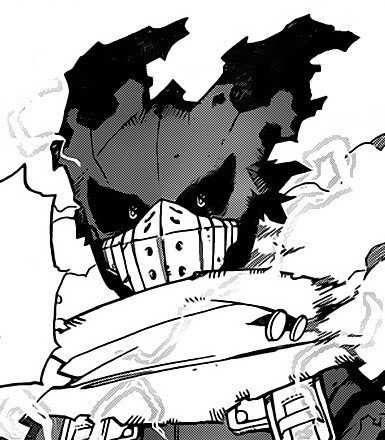
we got a glimpse of this in the cleaned-up scan of 307, but seeing both of his eyes looking so distinctively All Might-esque here is... whoa. I mean we know that his face still looks pretty normal underneath the mask and he doesn’t actually have the black sclera, but still, this is an awesome look. mini-Might
lol Muscular
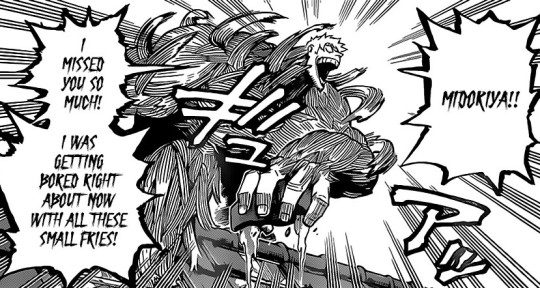
you and me both. I mean no offense, but yeah
so Deku is just standing there silently
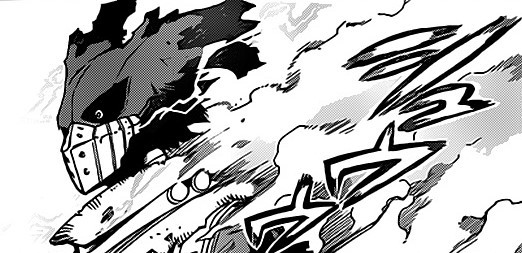
typical Deku. tight-lipped and expressionless. mum’s the word. quiet as a mouse. silent as a grave
okay no but seriously this is so weird and creepy though you guys. Deku please say something or else I’m just gonna mindlessly say whatever stupid things come into my head in an effort to make things less awkward
so Muscular is all “I should probably make a cool speech about revenge but Horikoshi couldn’t think of anything good so I’m just going to stand here clenching my fist real slowly”
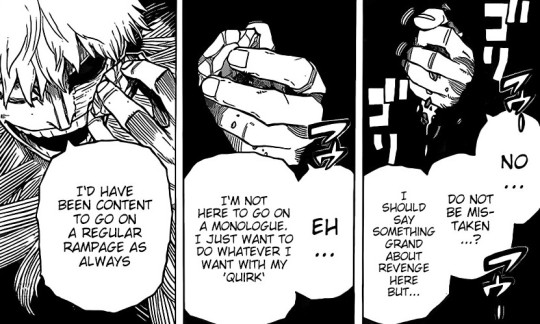
“I’m not here to go on a monologue” he says, as he monologues about not monologuing
okay you guys I confess I have only read through/watched the Deku VS Muscular fight once because the arm-breaking is just way too uncomfortable for me to revisit. and so as a result, I have completely forgotten Whatever The Deal Is with Muscular’s eye lmao so let me go look it up real quick
okay so it’s a prosthetic, obviously, and he changes it out according to his mood. that part does sound familiar. I just can’t remember which eye is supposed to indicate which mood. don’t tell me I actually have to go back and reread this shit
lol I’m skimming through chapter 75 now and remembering/realizing that I hardly paid any attention to this the first time around because as soon as I found out the villains were after Kacchan my brain was like “TIME TO FOCUS ON THIS AND ONLY THIS NOW AND FOREVER” and yeah. ah memories
anyway so he started out with the flower-looking eye, and then later on he was all

which begs the question, how on earth could I have ever forgotten the most ridiculous panel I’ve ever read lmao
anyway, but so after all of that, I'm only just now realizing that this isn't one of his previous eye prosthetics in the current chapter; this is an ACTUAL FUCKING ROCK that he's just randomly shoved into his eye socket fkdsjlk
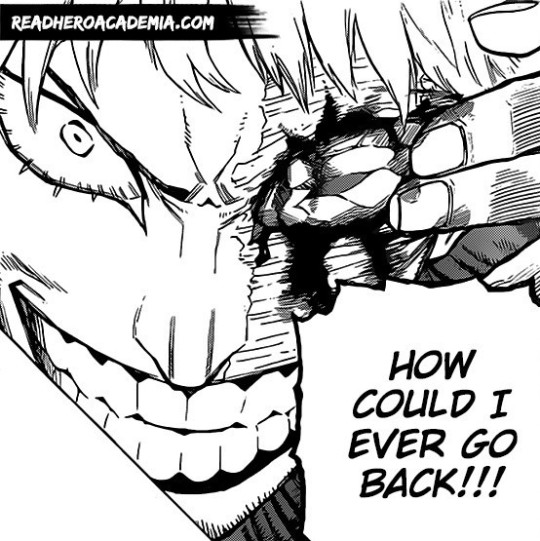
so basically (1) I did all of that painstaking research for nothing, five whole minutes of my life wasted THANKS A LOT, and (2) what, and I have never meant this more emphatically, THE FUCK
anyway so now he's leaping at the building that Deku is standing on top of. but he’s not aiming anywhere near Deku though, wtf
(ETA: HAHA YOU BROKE ALL YOUR MUSCLES YOU LOSER.)
...huh
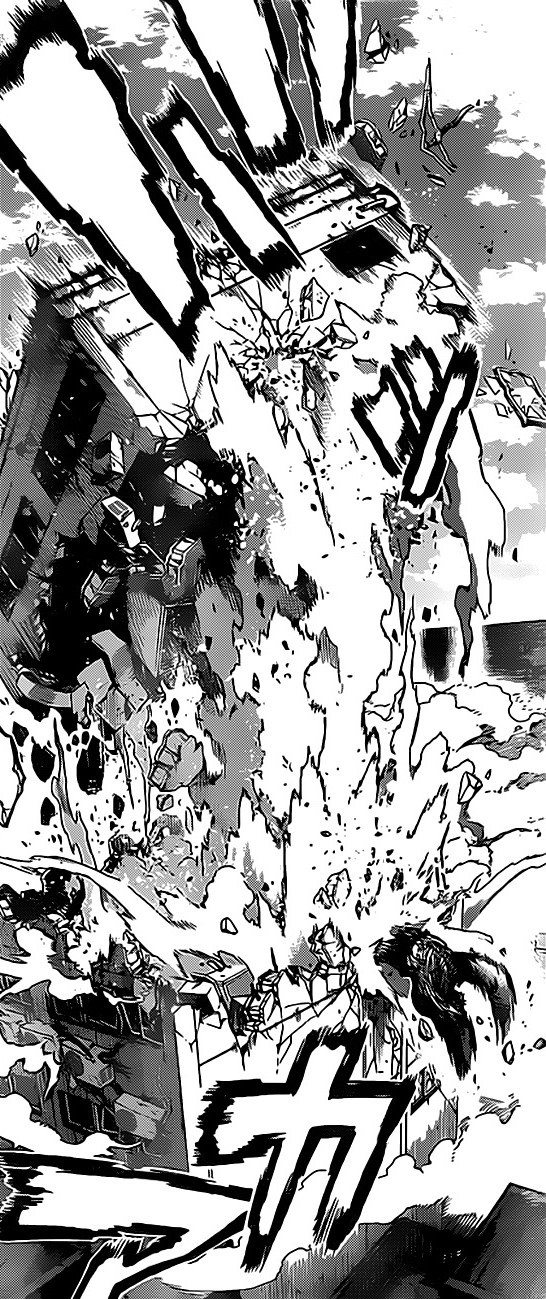
lmao okay then. I hope those annoying citizens in the building next door are watching this go down and rethinking their life choices
dlkdkljk
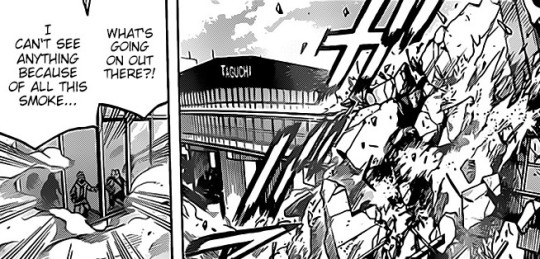
just keep standing there pressed right up against the window, why don’t you. “WHAT’S GOING ON THIS SUPER CLOSE COLLAPSING BUILDING IS BLOCKING OUR VIEW.” well, folks, we’ve long since known there’s a critical shortage of hero and villain brain cells, but what we’re learning now is that civilian brain cells are also in short supply
OH THANK GOD DEKU IS FINALLY TALKING THAT WAS ACTUALLY UNSETTLING AS FUCK
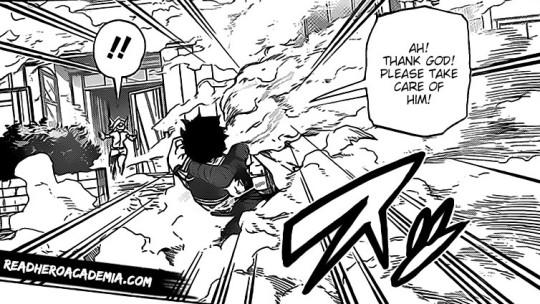
SO HE’S STILL OUR GOOD, POLITE, WORRIED, CONSIDERATE DEKU UNDERNEATH THAT COOL AND MYSTERIOUS VENEER. for real, thank fuck, because I swear to god if he suddenly started acting like the Dekus in all of the vigilante AUs my interest in this series would have dropped something like 50% lol. just because he dropped out of school and ran away from home and is currently dressed like the physical manifestation of a Linkin Park playlist doesn’t mean he’s not still the WORLD’S BIGGEST DORK okay
I MEAN, THIS RIGHT HERE. THIS IS WHAT I’M TALKING ABOUT. HE’S APOLOGIZING FOR THE DELAY
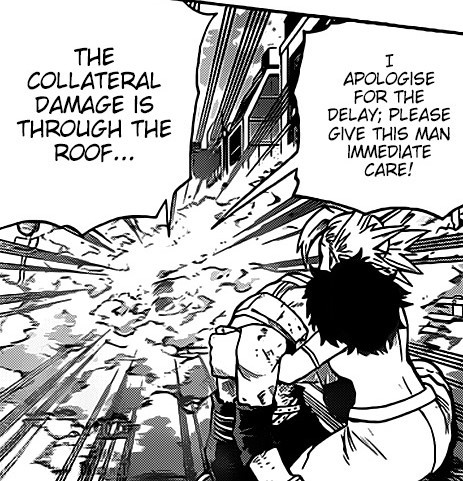
PLEASE FIND THE ATTACHED SHINDOU YOU REQUESTED. BEST REGARDS!!!
OH MY GOD WHY IS HE SUCH A BADASS
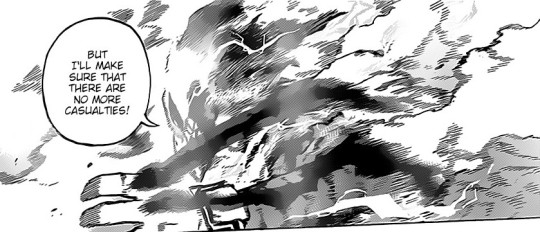
something about making bold, confident statements while obscured in smoke?? idk but damn it fucking works
ffjkkl

more importantly, should you tell him you actually need your copy of Shindou in excel format and not pdf?? on the one hand you don’t want to sound ungrateful, but on the other hand what are you even supposed to do with this
this chapter so far consists of like 50% smoke, but on the other hand Deku VS Kacchan 2 had a lot of cinematic smoke too so who am I to complain
OMG IS IT HIS ARMS

IDK DID YOU?! TELL ME YOUR SECRETS. PLEASE, AT SOME POINT THIS FIGHT HAS GOT TO ACTUALLY ADVANCE THE PLOT
OHHHHHHH

IT’S EN’S QUIRK!! OH MY GOD OKAY THAT’S ACTUALLY AWESOME
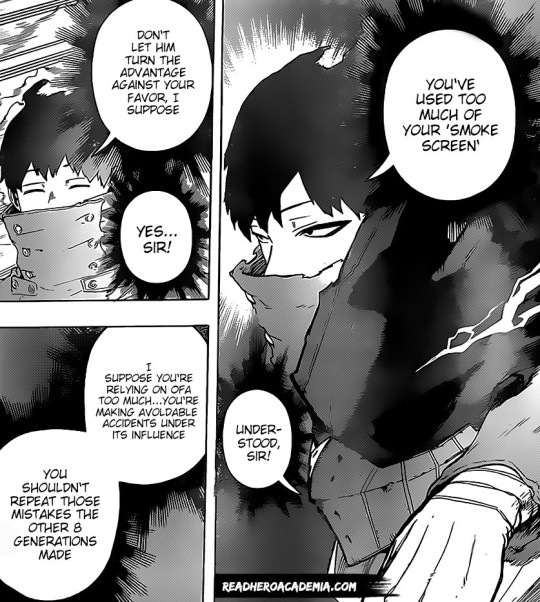
I CAN HEAR THE SOUND OF DISCOURSE RUMBLING IN THE BACKGROUND BUT I DON’T CARE LOL. WON’T CATCH ME EVER SAYING NO TO ANOTHER SIXQUIRK. GO AHEAD, BRING THEM ON, I WANT TO SEE THEM ALL but take it easy though Deku. don’t want to give yourself lung cancer or anything
also it’s good to see that in a very real sense he’s not fighting alone. the Vestiges really did mean it when they said they could appear more easily now. this is on a whole other level
so is this whole next page still En talking, or someone else? because whoever it is sure is chatty
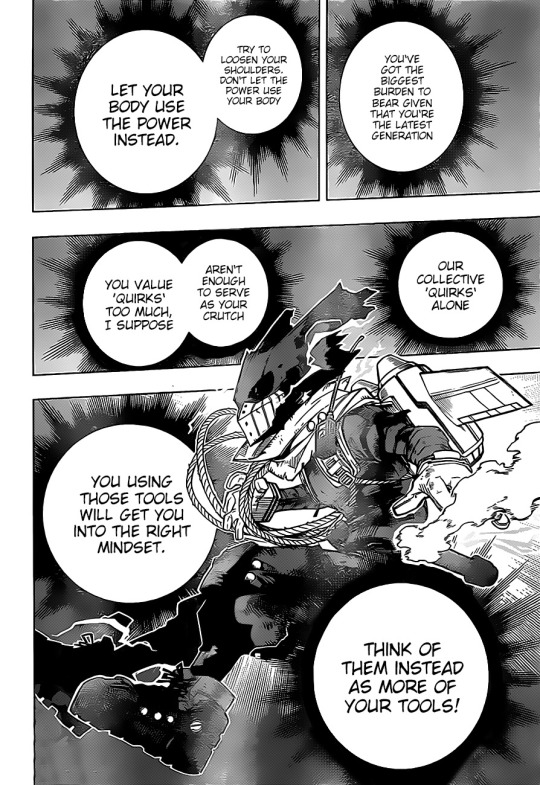
okay, several things
pretty sure it is En, because he keeps saying “I suppose.” for someone who never said two words until one page ago, this guy sure never shuts up. we can’t all follow Muscular’s lead I suppose. oh my god now I’m doing it too
really like the suggestion of Deku using the SIXQUIRKS like tools in an arsenal, because that’s what he’s good at! it’s almost like he’s been training for this his entire life. “you value quirks too much” LOOK HE JUST THINKS THEY’RE COOL OKAY IS THAT A CRIME
where the fuck did all this rope come from
not gonna ask what the fuck that thing is sticking out from the back of his utility belt. Horikoshi will surely explain this
is that a fucking jetpack. I’m sorry Deku were six fucking quirks not enough for you. you can fucking float??? but JUST TO BE SAFE, LET’S STRAP A PAIR OF ROCKETS TO OUR SHOULDERS IDK
-- or wait, is this all supposed to be like a visual representation of En’s metaphor?? OH MY GOD AM I JUST STUPID LOL, DON’T ANSWER THAT. NEVER MIND. NEW LIST!!
rope = blackwhip
jetpack = float
radio = danger sense
and so I’m guessing that this ridiculously phallic thing is supposed to be a flare or something?? and that = the new quirk, smokescreen. well that was a fucking ride lmao we now return you to our regularly scheduled chapter
so now Deku is floating to his heart’s content and thinking that he’ll just sneak up on Muscular and vibe check his ass or whatever
WOOOOOOOO DANGER SENSE YESSSS I LOVE THIS FOR HIM
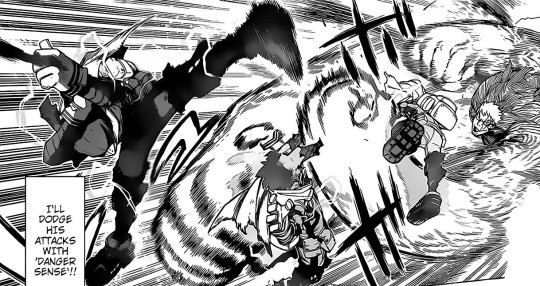
okay guys, I'm gonna press pause here for a sec to make a serious note, because I am loving the shit out of this, but tbh I'm having trouble enjoying it as much as I want to because I keep getting anxious thinking about the discourse. I know that a lot of the fandom has very strong opinions on Deku's character development one way or the other, and I want to respect that. but I also really have no spoons to debate this topic at all beyond what I’ve already weighed in on. so if it’s all the same to everyone, I plan on staying out of this discussion, at least this week
anyway! that said, YEAH BOI GET HIS ASS
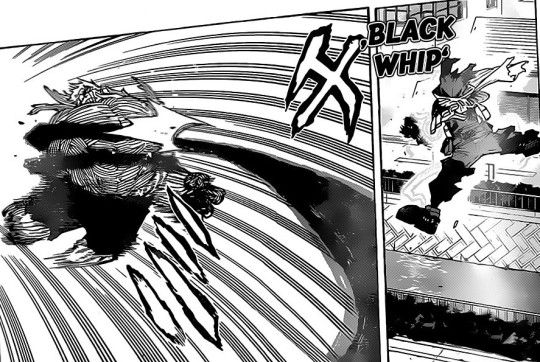

VIBE: CHECKED. CURB: STOMPED. HOTEL: TRIVAGO
-- OF COURSE HE’S STILL FUCKING FINE LOL HE CRASHES INTO BUILDINGS FOR FUN IDK WHAT I WAS EXPECTING
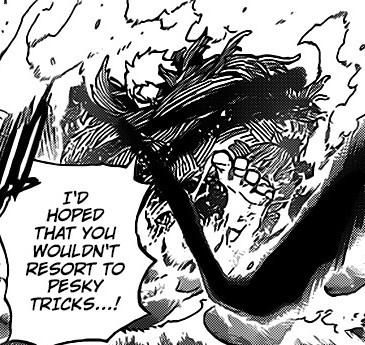
dammit Muscular. how many fucking quirks does it take to beat you?! the annoying thing is that even with all of his cool new powers, Deku is still something of a mismatch against him. anyway r.i.p. to all these poor buildings
OOOOOHHHHH

you guys have no idea how intrigued I am at the prospect of watching Deku try to play both good cop and bad cop here lmao
anyway so Muscular says he doesn’t know, go figure
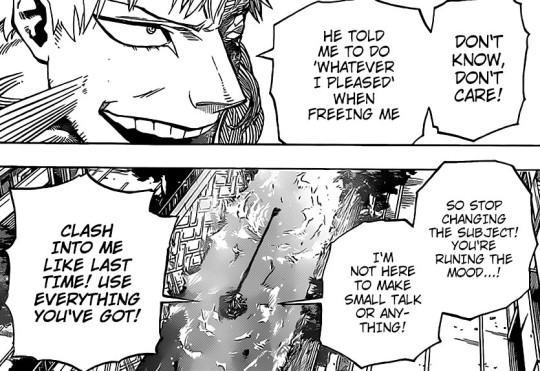
“I’m not here to make small talk or anything” he says as he small talks about not small talking
OH MY GOD DEKU
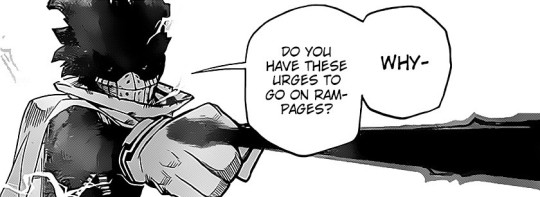
are you really gonna talk no jutsu all of these villains from now on?? that last battle really did have a profound impact on you, huh! interesting
you guys he’s really doing it omg

Deku this guy tried to murder a five-year-old literally just for fun. I mean more power to you, but holy shit you’re really gonna try to defeat Muscular with anger management therapy huh
I MEAN
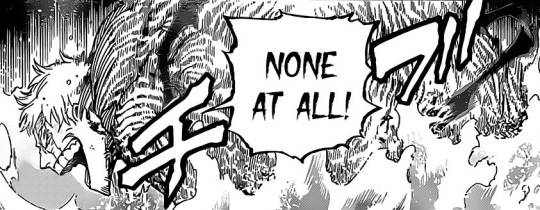
WHO COULD HAVE SEEN THAT RESPONSE COMING dlkjslkjk
FUCK’S SAKE DEKU, I KNOW YOU MEAN WELL BUT THEY CAN’T ALL HAVE TRAGIC PASTS KIDDO
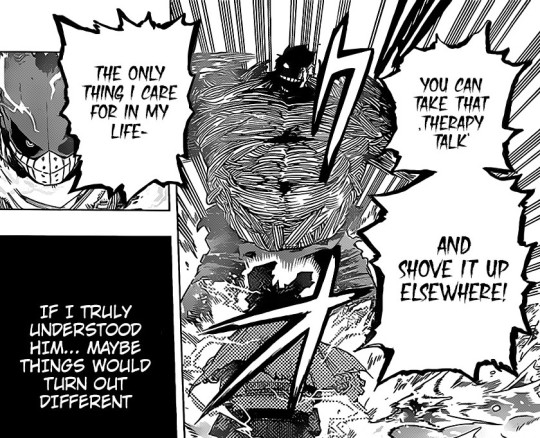
but. I have to admit, I do still like that he tried. probably knew just as well as we did what the end result was going to be, but still. he made the effort in good faith and I respect that
uh oh
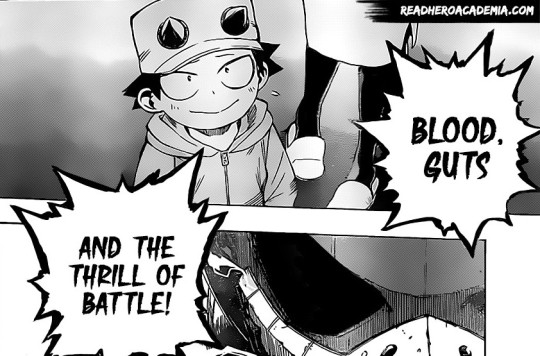
why do I get the feeling Muscular just got a whole lot deader
oh my god oh my god he’s doing the “powering up” stance ffff don’t fucking tell me you can still use your fucking arms here, Deku
BUT MORE IMPORTANTLY WHAT’S THIS??
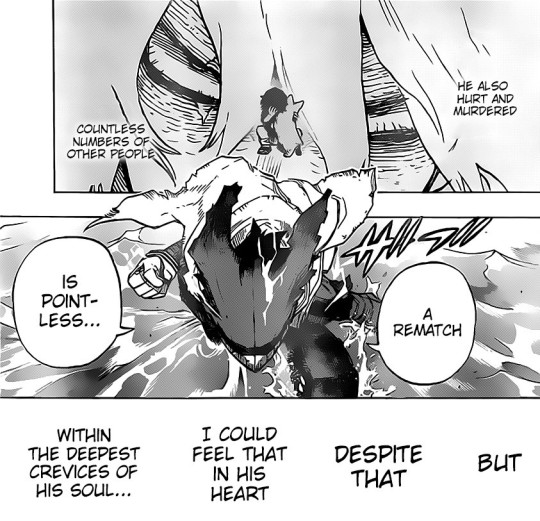
okay so basically he’s saying that whatever it was he sensed in Tomura, he doesn’t sense from Muscular. which, yeah, that sounds exactly right. good judge of character here lol
AHHHHAHAHA YESS
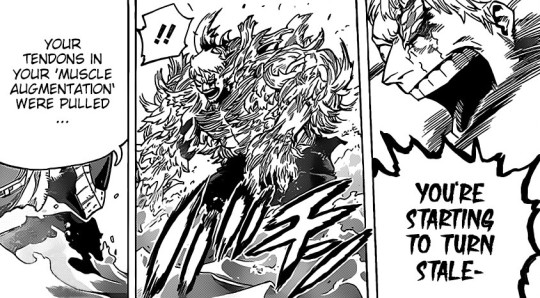
WHOOPS, GET FUCKED I GUESS
WOOOOHOOOOOOOO
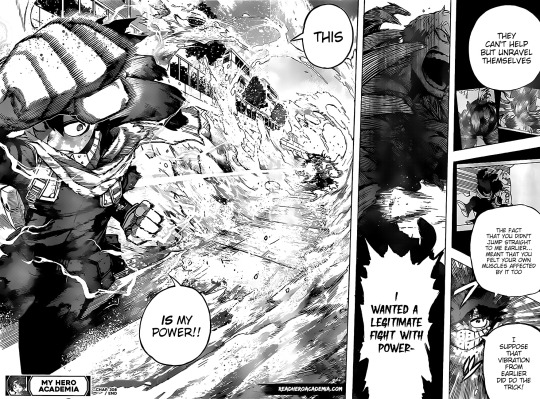
lmao so apparently this is the belated result of Shindou’s attack from chapter 307?? I’ll be damned. good for you Shindou!! I always liked you buddy. please just take my word on that and don’t fact check that statement
okay lol the one tiny bit of discourse I will allow is that it’s bullshit that he just did that with his right arm. like, I’ll fully acknowledge that. that makes no fucking sense, and I demand an explanation from the Great Plot Hole Filler himself. he’s never let us down before when it comes to continuity so I’m trusting him not to suddenly start now
that said, we love to see a rematch against a boring guy settled quickly and decisively within the span of a single chapter. THANK YOU
I like that Deku implies that his power is being a smart nerd who battles villains using the power of ANALYTICS. he basically didn’t do anything except restrain Muscular and wait for Shindou’s attack to take effect while halfheartedly checking to see if he regretted any of that murder and stuff
(ETA: and almost forgot to mention, he made excellent use of all four of his active SIXQUIRKS. it’s like the chapter title said; this is basically him fighting all-out, and it’s a sight to see.)
also, as cool as the mask was, this just feels right. like, we had our fun, now let us see his face, yes good
anyway, I think this was a good start towards establishing What’s Up With Deku Right Now! so if it’s all the same to Horikoshi, I would next like to take some time to explore Why’s Up With Deku. that, and What’s Up With Everyone Else, Especially Kacchan. por favor
#bnha 308#midoriya izuku#muscular (bnha)#bnha#boku no hero academia#bnha spoilers#mha spoilers#bnha manga spoilers#makeste reads bnha
463 notes
·
View notes
Text
return of the last qt reread
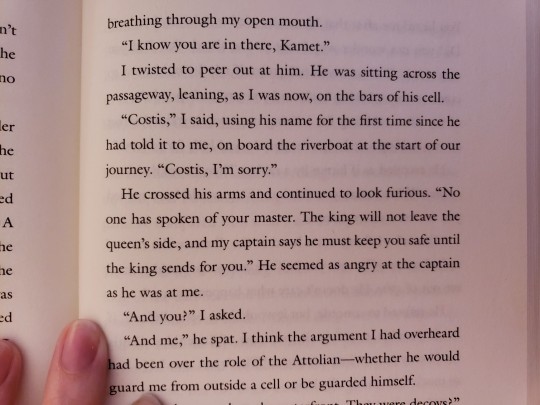
Previous posts here, here, here, and here.
Just finished the QT release trivia party and launch party, and as of this very moment in time I have the book on my iPad ready to be read, but Jade says I have to finish this post first. She’s right, of course, as always, but never in my life have I been called a patient person, and the last few days have been rough enough I can’t stand the idea of delaying gratification a moment more.
But that would mean postponing Kamet, one of my favorite characters in the series, and that can’t be done, can it? No, no, it can’t.
I’ve obviously had a lot of thoughts about how a slave gains personhood over the years, and one thing I loved that MWT talked about at the launch party tonight was how she originally tried to write TaT in 3rd person before realizing it had to all go back and be strictly from Kamet’s perspective, because to do otherwise made him an object to which the plot happened, rather than any kind of agent in his own destiny. He has so far to go here, not just in distance but in mental autonomy, and I love getting to see every step of it. We see him thrall to Nahuseresh, nursing his beating and considering how best to navigate his moods; we see him possessive and anxious over his slave chain, despite his belief that Nahuseresh is dead; we see his slow, ponderous growth of respect for the Attolian and the king he serves. Some of it comes in lightning strikes of realization (the slave camp, the fights with the Nasreen & the miller, the last chance to leave after Godekker); most of it is so careful and unconscious, little step by little step, that we hardly realize it’s happened until it’s over.
Of course Kamet will stay with Costis. Of course Kamet will remember the beautiful things of Attolia. Of course Kamet will serve Eugenides by revealing his old master’s secrets to him, willingly and without grudge. But then you go back to the first chapter and watch his dealings with Laela, with Rakra and his accounts, and it is almost a wholly different person. Every step is so hard-earned and hard-won, not just in terms of personhood but in terms of his relationship with Costis, that it’s all the more precious when he finally calls him by his name (in the exact opposite of the successful return Costis’d hoped for, I think).
And of course, any book that lets us spend more time with Costis is a boon to our hearts. I don’t remember the first time I realized it was Costis the first time I read it, but I think it was pretty early (a mark of MWT’s consistency in characterization if nothing else), and this time, unlike the first time I read KoA, I really got to enjoy sitting back and watching the POV character come to grips with a partner who constantly confounded his expectations. I love that Costis is the one Gen truss with the mission and his sea. I love that Costis wins Kamet over not because he means to, but because he can’t help it. I love that Costis tins a pot for a random citizen for food, because why not?? Why not!! Let the man tin pots and sing while he works!!
I could also spend another several paragraphs on the lyrical Medean mythos revealed in this book, too, but I will settle for marveling into the infinity at what a chameleon MWT can be in this craftsmanship. It’s one thing to talk about Hespira and Meredite and Horreon, pulling on those Grecian-style myths we already know; but to slide so effortlessly into the these song-like Medean tales wholly unlike anything we’ve read so far is absolutely astounding. Ennikar and Immakuk are spectacular, the way they interact with the world is spectacular, and that Immakuk the wise Immakuk greatly wise cloaked in wisdom basically introduces himself to Kamet by going, “Hey Kamet, I’m, uh, I’m, uh, a wine trader, yeah! And you should follow me right now right this way, yep, that’s it that’s the story, come on buddy!!” makes me cackle every single time. Let the gods be real! Let the gods be friends with each other! Give me Ennikar making eyes at Hephestia from across the room and winking at one of the river goddesses and let’s see what happens.
Comparatively speaking, we spend very little time with Gen & Attolia in this book compared to the rest. It’s a footnote, almost, to the grand country-spanning adventure we’ve just had; and yet the Attolia work here is some of my favorite in the series. Now we see Gen come into his own at last, the respect he’s garnered from his people and his country, and even occasionally from those outside it (the Braelings, the hints of interactions with the allied powers). The scene in the garden with Irene (the river knows its time) is one of the softest and gentlest--and most painful--in the series, and it makes my heart tremble to think how easily a lesser author might have nixed it for something more bombastic.
I love this book. I love everything about it, and the new characters and myths and gods it gives us, and the stage it sets for this final chapter. Jade was right; I needed to finish this post before I started it. But there it is on the iPad, its statistics intro taunting me with an average reading time of six hours and four minutes, and I can’t help but see that as a challenge.
I’ll jot down some predictions in another post, and we’ll see how I do. Thanks to everyone who’s read along! <3
45 notes
·
View notes
Text
The Lady In Waiting - Part Three
In which you’re the lady in waiting for the princess, and the mysterious, quiet prince has taken a certain interest in you.
Warnings: none
Pairing: Royal!Calum Hood x Reader
A/N: its been a hot minute but....its back bitches!! ahh i’m very happy i got off my ass and started writing this again. i missed prince!cal. but anyway, here’s part three, let me know what you guys think!!! feedback is always appreciated!! do you guys have any predictions as to what will happen in the future? anything you WANT to see happen in the future (i can try to work in some suggestions?) let me know!
Series Masterlist
***
Ever since Mali decided to play matchmaker, she had been scheming ways to get Y/N and Calum alone together. It had to be subtle, make it seem like it was a coincidence, because it was true that Y/N could get in trouble for talking to him on the job.
She also wanted the conversation to be natural. She didn’t want to tell either of them about it and have them sit and plan what they were going to say. It would be painfully awkward. She would prefer that they just struck up a conversation on whatever came to mind; nothing forced.
Mali eventually came up with a plan. Calum always went to the library on Thursday evenings after dinner to unwind and read. Her idea was to call for Y/N to find her a book from the library, and when she arrived, Calum would be there, and that would be the perfect opportunity for them to talk. It wouldn’t be long, Mali knew, but it would be something, and that’s all she wanted.
Mali liked Y/N. She was kind, thoughtful, caring. She thought she could be good for her brother; he was quiet, stuck in his head a lot, and Mali thought a girl like Y/N could be someone to help him out of the funks that he tended to get himself into.
The next Thursday that came around, the Hood family finished having their dinner, and Calum was off to the library, like always. The place was big, and the isles of books seemed to go on forever. As much as he loved to read, he knew he would never read every single one. The collection was years in the making, and as time went on, it would only grow.
Calum browsed the books for a few minutes, skimming his fingertips over the spines and reading titles until he found one that piqued his interest. He pulled it from the shelf and took it to one of the large cushioned chairs to read.
Y/N was just finishing up her own dinner when she was notified that the princess was looking for her. She quickly said goodnight to Michael, who she was dining with, like usual, and made her way upstairs to Mali’s room. She knocked, and the girl opened the door with a grin.
“You called?” Y/N inquired. Mali nodded, placing a hand on her hip.
“Yes, I was just wondering if you could run to the library for me? I’ve been dying to reread this book.”
“Oh, sure! What book would you like?”
Mali proceeded to tell her the name and author of the first book that came to mind, and made sure to let Y/N know that there was no rush. To take her time. Y/N thought it was odd, the specification for her to take her time, but decided not to give it much thought as she made her way to the library, repeating the title and author of the book in her mind so she wouldn’t forget it.
Y/N couldn’t help but smile a little when she stepped foot into the library. The smell of books always comforted her. It was soothing.
But, in this library, Y/N felt a little lost. She had only been there one time, and she only looked around. She didn’t actually seek out a book, and she had no idea where to even start looking. She sighed, starting to look around for some sort of pattern in the titles or authors when she heard a voice call her name.
“Lady Y/N?”
She turned around at the sound of her name, and her heart skipped a beat when she saw who it was. The prince stood up from the chair he was sitting in, closing the book in his hands and setting it down. Y/N dipped into a curtsy that she had perfected since arriving at the palace, sending a smile to him.
“Good evening, Your Highness,” she greeted, scolding her own heart for the way it was pounding in her chest.
“There’s no need for that, please,” he insisted, shaking his head softly. “Looking to do some reading?”
“The princess asked me to get a book for her.” Y/N took a glance around the library before returning her gaze to him. “I have no idea where to even start looking, though.”
“Oh, I can help you! I spend a lot of time here. What book is she looking for?”
As she rattled off the book and author that she had repeated in her head upward of a thousand times, she had to bite back the soft smile that was threatening to take over her features. She found it sweet that the prince enjoyed reading. It was something she liked about him.
Calum thought for a moment before cocking his head to the left, signalling for Y/N to follow him. She trailed behind him slowly, then stepped into the aisle that he went in.
“Should be in here somewhere,” he mumbled under his breath, eyes scanning titles to find the one that Mali mentioned. Y/N accompanied him in searching until her gaze landed on the correct book.
Calum found the book at the same time, and then reached for it at the same time she did. Their hands brushed against each other, and although the moment was brief, Y/N felt like there were fireworks exploding inside of her. It wasn’t the first time they had ever touched; Calum shook her hand upon their very first meeting. But she couldn’t ignore how it felt different.
She also couldn’t ignore that, while still not having spent much time around him, she felt different about him. She didn’t know how she felt, though, and it terrified her.
Calum felt his heart skip a beat at the contact of their hands, a feeling not too different from how Y/N felt. He hadn’t had the opportunity to get to know his sister’s lady in waiting, but he wanted to. He just didn’t know how to approach her. He was a man of few words, and despite the fact that he had made countless public appearances and spoke to myriad people, total strangers, ranging from commonfolk to other royalty, he always got sweaty palms and found himself having to force the words out of his mouth. Especially when it came to Y/N.
He didn’t know what it was about her that made him so nervous, but it was definitely something.
Snapping out of his mini moment of freak out, he quickly pulled the book from the shelf and held it out to Y/N, who took it from him with gentle fingers.
“Thank you,” she breathed out, clutching the book to her chest. Calum grinned and nodded his head swiftly.
“Of course,” he responded, running a hand through his dark curls.
Y/N sighed softly, glancing behind her and then back to him.
“I should probably get this to the princess,” she mumbled. “Thank you so much for your help. I’d probably be on the wrong side of the library right now.”
Calum laughed, a pretty sound that Y/N suddenly wanted to hear more of.
“Well, glad I could save you the trouble. Have a good evening.”
“You too, Your Highness.”
“Please, dear. Call me Calum.”
Y/N froze for a moment, glancing up at him to see he looked just as shocked as she probably did. A small smile graced her features, and she mumbled an, “Okay, Calum,” before scurrying out of the library.
Calum speed walked back to his seat where his book sat, cursing under his breath. He had no idea what compelled him to call her dear; it certainly didn’t seem like something the shy prince would do to a woman he hardly knew. It just came out, not realizing it until it was too late. Had their relationship been of a different nature than it was, he wouldn’t have cared at all. He always thought the nickname was endearing. But, since the two were hardly close enough to consider themselves friends, it didn’t seem appropriate. He silently prayed to whoever was listening that he didn’t make her uncomfortable.
Unbeknownst to the prince, Y/N was having trouble keeping the smile off her face as she walked back to Mali’s bedroom. She wasn’t blind, she could tell that Calum didn’t really mean to call her that, but her heart couldn’t help but flutter, nonetheless. She liked the way it sounded rolling off his tongue.
Aside from the nickname, there was also the fact that he had asked her to call him Calum. His sister had done the same thing for herself, and Y/N was feeling a similar way about it. He had to like or be comfortable with her to some extent if he wanted to drop the formalities.
She couldn’t help but feel special. She knew it was hardly justified and she seemed full of herself, but she liked the feeling of being accepted. Acceptance was a hard thing to come by, being from Georgetown.
Y/N rapped softly on Mali’s door. The princess opened it fairly quickly, an excited grin on her face.
“Hi!” She cheered, gaze landing on the book in Y/N’s hands.
“Hi! I got your book,” Y/N answered, holding out the book for her to take. She grabbed it, but she could care less about the book. Frankly, she probably wasn’t even going to read it. She wanted to see if Y/N and Calum talked to each other.
“Thanks so much, Y/N.” Mali reached over and set the book on her dresser. “Was anyone else in the library?”
“Oh, yes, your brother was there. He helped me find the book.”
Mali’s face lit up the slightest bit, causing confusion to wash over Y/N. Why would she be so happy about her and her brother having a conversation, a fairly brief one, at that? Suddenly, Y/N remembered the conversation they had over breakfast just the previous week. She remembered how Mali said Calum may like her a little, and how she said it was okay for her to talk to him. Maybe she had wanted them to talk to each other, and this was her little way of getting them to do it herself.
“That’s very sweet of him, isn’t it?” Mali inquired, still grinning mischievously.
“Yes…” Y/N trailed off, unsure of where the conversation was going.
Mali decided to let the topic be for the evening, but her and Y/N both knew this wasn’t going to be the last of her endeavors to get her lady in waiting and her brother to start talking. She knew it wasn’t guaranteed that they would fall in love, but she thought Y/N could at minimum be a good friend for Calum to have.
After the two bid their goodbyes, Y/N made her way back to her quarters, a room she had grown quite familiar with over time. It was almost comforting, when things around the palace got too overwhelming.
It wasn’t very late, and Y/N knew trying to sleep so early would be futile. She pondered what she could do to keep herself entertained until she got sleepy, a list of options that was fairly short, eyes scanning the room to look for inspiration. Her searching brought her gaze to the crisp white envelope that was sitting on top of her dresser; it hadn’t been there before. She picked it up with curiosity and turned it over the read the back. It was from Aunt Mary.
A smile spread across the girl’s face. It had been a while since she heard from her. She tore open the envelope as she moved to sit on her bed, pulling out the letter. Her smile didn’t fade as she carefully took in all the words, glad to see that Aunt Mary said she had been feeling a lot better.
Y/N grabbed the leather bound notebook that she was given and a writing utensil after she finished reading, and propped herself up against the headboard of her bed again. She flipped to the nearest empty page, and began to write.
Dear Aunt Mary,
It’s great to hear from you again! Mail was slow, I guess?
I’m so happy to hear you’re feeling better. I knew the doctors from the palace would do a much better job taking care of you than I ever could. But anyway, this is progress! And I’m sure it’ll only get better from here.
How are things in Georgetown? I can’t imagine it’s been eventful at all, considering it usually never is. But if you hear any gossip, make sure to let me know.
I never thought I’d miss the place, but I do. Remember how many times we’ve talked for hours about how much we’d like to get out of the little town and live in a big city? As much as I would still love to do that with you, I’d do anything for just a quick walk around the square. It’ll always be home for me.
I miss you. I miss talking with you about anything and everything, and having our meals together. I miss your hugs, too. Yours are always the best. Maybe I’ll be able to come visit you soon! I’ll have to talk to the princess, but I’ll definitely try to make it happen.
Speaking of the Hood’s, I’ve definitely taken an even bigger liking to them. I still don’t see much of the king and queen, but the princess and the prince are very sweet. The princess asked me to have breakfast together a little while ago, which was exciting! The prince is very nice, too. Quiet, but nice. I like him.
Y/N paused, staring at the paper for a moment. She debated on telling Aunt Mary about her strange feelings about Calum, but decided against it. One conversation wasn’t enough to justify telling her quite yet. She decided to wait and see if anything else happens. So, she wrapped up her letter.
That’s pretty much it from me. It’s been rather uneventful here in Alexander, or as uneventful as it can be in the Hood’s palace. I’ll let you know if anything important happens.
I love you so much, Aunt Mary. Write soon!
Love,
Y/N
She gently tore the page from her notebook, getting up to set everything on her dresser. She made a mental note to ask for it to be sent her aunt’s house the next day.
Deciding to call it an early night and try to fall asleep, she got herself ready for bed and got comfortable in her sheets. A sudden wave of tiredness washed over her, and she let her eyes flutter shut. It wasn’t a long time before she drifted off to sleep.
Calum, who had stayed in the library a lot later than he normally did, just arrived back to his bedroom around the time Y/N was readying herself for bed. He tried to continue reading his book, he really did, but the words seemed to slip right past him. He couldn’t remember a thing he read.
All he could think about was calling you dear.
He hated that he did it so out of the blue, at such an early point in your relationship. But, he almost wanted to give himself a second chance. A do over, of sorts.
He wanted to call you dear again. Under better circumstances, of course.
In order to have that opportunity, he knew he had to talk to you. A lot more often than what he was doing. While striking up conversations wasn’t exactly Calum’s forte, he was willing to try.
He was willing to try for you. The lady in waiting.
-
taglist (send me an ask to be added!) (strike through means i couldn’t tag you):
@cosmixcalum @cold-coffee-clifford @depressed-teapot @sick-orca @singt0mecalum @cashtonsicetea @stylessilhouette @bbyboyycal @thepixiedreambitch @emotionalhue @xxsometimestheywinxx @bluevxnus @calssunflower @stupid-gracie @cxddlyash @singledadharrington @rotten-kandy @cthoodsthetic @youngblood199456 @ihatesatan96 @cliffordcntrl @maoricth @calteahood @whosamykayt @porterswrld @punkrock-cinnamonroll
#genny writes#the lady in waiting#calum hood#5sos#5 seconds of summer#calum hood imagine#calum hood smut#calum hood au#calum hood blurb#calum hood x reader#calum hood x you#calum hood x y/n#royal!au#royal!5sos#royal!5 seconds of summer#royal!calum hood#royal!calum#5 seconds of summer imagine#5 seconds of summer smut#5 seconds of summer blurb#5 seconds of summer au#5sos imagine#5sos blurb#5sos smut#5sos au#5sos x reader#5sos x you#5sos x y/n#5 seconds of summer x you#5 seconds of summer x reader
235 notes
·
View notes
Text
Evak Fics - Reconciliation
Read the tags as a few might be open ending. And in some of these they were still together in the beginning. Man, this list is angsty! I’m already planning on rereading them.
This will be under a read more.
Light by bri_ness (885 words) - Open ending. Even lays a beach towel down on the small patch of grass beside his apartment building’s parking lot, right beside the dumpster. He knows romance can thrive in spite of its setting. He looks at the stars, and he remembers.
pull him back by hippopotamus (2k words) - “That’s my hoodie,” Isak says. “You left it at mine,” Even replies, as if Isak wasn’t fully aware of that. “And you didn’t ask for it back.”
Resolution by bri_ness (2k words) - Isak's residency has him questioning his decision to be a doctor. When he's home for the holidays, he runs into Even, who gives him a new perspective.
No One Knows Me Like You Do by obscurial (2.6k words) - He’s also shockingly sober, which only serves to remind him that fuck, he doesn’t even have an excuse for randomly messaging his ex-boyfriend of two years, out of the blue, at a socially unacceptable time to text your ex, if there even was one in the first place.
Still Unformed by colazitron (3k words) - Even and Isak broke up a few years ago when Even moved to Germany to attend film school. Now he's moved back to Oslo.
there's no one else I'd rather do this with by daddyhonkkk (3k words) - Even still has the extra Gabrielle ticket Isak got him for his birthday, but that was before they broke up.
Like Breathing by BraveKate (3k words) - Even invites Isak to the premiere of his first movie. Part of a series but could be read as a standalone.
left-handed by thekardemomme (3.5k words) - even always asks questions he doesn’t want to know the answers to.
If Only by Stria (Asia117) (3.6k words) - Chatting with a random stranger that turns out to be your ex trope.
o night divine by thekardemomme (4k words) - This is the first Christmas in nearly five years that he’s spending without Isak, and while he still decorated his apartment and bought eggnog and spent an excruciating amount of time wrapping all of his gifts perfectly, the hole in his heart hasn’t gone unnoticed.
Homesick by everything_else (4k words) - 5 times they take care of each other after the break up. +1
Waking up to Nothing by dropdeadfox (4.6k words) - It’s been six months since Even has seen that grumpy- but- adorable pout on the most perfect pair of lips imaginable to men (and women). It’s been six months since he has heard that voice, it’s been six months since he has seen the most perfect, emerald- green eyes, gazing back at him.
42 Seconds by thekardemomme (5k words) - Sunday is Isak’s ideal day. The day he looks forward to. This Sunday, Isak wakes up at 1pm, and the room is dark. The bed is empty and there’s no smell of breakfast. Even hasn’t slept next to him all week. The only thing that’s the same as every other Sunday for the past 23 months is the fact that Isak doesn’t want to get out of bed.
Inbox: (1) New Email by scritch (6k words) - A story about falling back in love, one tweet, instagram post and email at a time
the one where even says the wrong name by pansexuaIeven (6.5k words) - Even's getting married to Sonja, not Isak. The real question is: does he know that? Inspired by Friends.
Shatter Me by givemesumaurgravy (6.6k words) - Even’s crying, he has been since the words ‘I slept with someone else’ left his mouth. To be honest, he’s been crying for hours since he got home from Mikael’s.
Isak just sits there stoically and he says, “I’m not going to yell or any of that. I’m just going to make this really fucking awkward and uncomfortable for you.” “I want you to tell me everything that happened,”
That look you give that guy by Lokkanel (7.4k words) - Isak and Even love each other in secret. It is almost thrilling at first, but when hiding and lying to their friends begin to take a toll on Even, Isak decides to end it all. He thinks he has taken the right decision, until Even eventually moves on with someone else.
Calleth You, Cometh I by Kollakolan (8.4k words) - “Isak!” Mikaels pipes up. “Didn´t you two have a thing?” he turns to Even. A thing, Even thinks to himself. Yes, Isak and him definitely had a thing. They actually had a low-key thing going for years, but it never really turned into something more. The timing was never right.
We Keep This Love in a Photograph by kapplebougher (8.7k words) - It's been four weeks since Isak and Even made the decision to call it off. Now, Isak's back in their apartment of seven years and he's supposed to be moving out, but then he stumbles upon some memories that makes doing that a little difficult.
Our Steady True North by verlore_poplap (orphan_account) (9k words) - Five times Isak and Even were amicable; plus one time they just weren't. Plus an epilogue
In Vino Veritas by Sabeley (9.9k words) - After seven years apart, Isak wakes up to find Even in his bed and a wedding ring on his finger.
What becomes of the broken hearted by Kikki1 (12k words) - Set many years after Skam ended. Isak is living the life he always dreamed of. He has a good job, amazing friends and a superhot boyfriend. But his heart is forever broken.
we still fuck by evak1isak (13k words) - Isak and Even had broken up. Period. But they couldn’t keep their hands off each other.
Heal My Heart for Christmas by iwritetropesnottragedies (recklesslee) (13.5k words) - It’s been ten years since Isak left his small town for the big city of Oslo with his father. He hardly even thought of his time there anymore. Until he received a letter from his mother asking him to come home for Christmas for the first time since he had left.
in these deep solitudes and awful cells by hippopotamus (14k words) - it ends badly. so badly that they both wish they could forget about it. they meet again a few weeks later, and it’s hard to remember why it had to end.
If I Should Fall Behind by MinilocIsland (14k words) - The plan for tonight had been crystal clear. Stay close to his best friend, and steal her away if needed. Hold her hand through the ordeal of meeting Noora again for the first time in years. Then Even shows up – and suddenly, nothing goes the way it was supposed to.
The Good Side by lavenderlady by (15k words) - Isak got the good side of the break up.
And after that and after that by Teatrolley (18k words) - They’re friends, and roommates, and exes. Then Even becomes single again
you told me we were forever by Skamtrash (19k words) - they don’t exactly get back together. Isak finds out he's having a baby soon after Even breaks up with him so he makes the decision not to tell him. Except Even finds out on his own 3 years later.
I'll be right beside you by hannakin (20k words) - ”It’s ironic isn’t it? I broke your heart and now mine is not working,” Isak continued. “Isak…” Even fought against the lump in his throat and the tears that burned behind his eyes. see the sequel below
Don't Dream It's Over by hannakin (11k words) - WIP last update march 2019. A new chance at life for Isak and a new shot at love for them that Even is not going to waste. Not this time around.
Let Me In by milk_o_vich (20k words) - Even’s eyes were wide and a little unfocused, flitting over Isak nervously. He was quiet for a long time, rain hitting the pavement outside, and Isak became kind of aware that Even must be freezing in his thin, damp t-shirt. Even pressed his lips together, then said, voice hoarse and quiet, “Can I stay here tonight?”
Just give me a reason, just a little bit’s enough by Amfelia (21k words) - Even discovers life is not always shiny and bright, sometimes it is just really hard.
shred by Jules1398 (22k words) - There were two versions of Isak Valtersen. The first Isak was the one that his friends knew. The second Isak, the real Isak, was much more complicated. He was trans, gay, and then there was his five year-old son, Adrian. Keeping the two Isaks separate wasn't that difficult. At least, not until he saw Even again.
and you fight until the finish line carries you home by strangetowns (23k words) - “Did you love him?” Isak looked down at the glass in his hand, the wine he’d barely had any of. He shrugged, carefully noncommittal, and glanced at Even out of the corner of his eye, raising an eyebrow at his expression. “What, are you jealous?” “Hearing it makes me glad, actually.” “Why?” A beat of silence. Then - “You deserve all the chances at happiness you can get, Isak.”
We're Not Broken Just Bent by TotallyTinkerbell (26k words) - They had made a decision that didn’t fall easy on either of them. A decision that still kept Isak awake at night in his bed that was too big and in his kitchen that was too empty in the mornings. On the couch in front of his tv-cabinet which was void of Even’s film collection, and in his hallway which no longer had a dozen pairs of shoes in it.
Self Control by nofeartina (28k words) - “I never meant to hurt you, Isak.” Without any pause Isak replies, “Well, you did.” He looks him in the eyes, and continues. “You fucked me up, Even.”
Reflections by Laika_the_husband (30k words) - He started walking, listening to Even’s footsteps behind him. Fucking Even. Isak knew he didn’t do this on purpose, that it was just an episode, but he had just grown so tired of them. Every time Even relapsed Isak remembered how only a few years ago he had sworn to take care of him forever. How certain he had been, back then, that minute by minute would turn into day by day and week by week and year by year and then into forever.
Different, but same by Crazyheart (31k words) - Isak and Even had broken up almost a year ago, and Even was devastated. At Easter he tried to get over it and went on a ski holiday with Yousef and Elias. At the cabin he met a guy that looked like Isak, except his dark, buzz cut hair, well trained body and rough, charismatic personality. The fact that he called himself Markus Simensen was even more confusing
Scene Three, Take Two by folerdetdufoler (31k words) - Isak is 23, a student in the veterinary program at NMBU, and working an internship at a clinic in Kongsvinger. He hasn't seen Even in three years, but randomly bumps into him on the street when he's visiting his mom in Oslo.
No day without it by skambition (32k words) - And his lips. Those goddamn lips. They brought back memories that Even had tried to forget about for like 10 years now, memories of laughing, smiling, kissing.
and the whole world is empty by dreamer_of_dreams (45k words) - The conversations were always stilted and quiet and benignly untrue. The phone calls eventually petered out. So, Even did what he thought was right for Isak. On an ordinary Thursday, eating dinner next to each other on the couch, Even looked up from his bowl of noodles, glanced at the clock ticking 9.21 pm and said, “I think we should break up.”
Every Minute Gets Easier by CrochetingWords (50k words) - His life had turned out beyond his wildest dreams. It was amazing, and when it got bad from time to time, that was still fine, it was still worth it, because the bad times were just a glimpse in their epic story and the good times were just so good, so pure, so abundant, that he knew they would make it through every struggle. Together. Which is why Isak never imagined his current situation: Filing an application for separation.
Carry on by hannakin (52k words) - For a moment Even just looked at him. Beautiful, amazing Even who was the best thing that had ever happened to Isak. There were tears in his eyes too. When he shook his head sadly, one tear made its way down his cheek. “I think I want to break up” He finally whispered.
God Only Knows (What I'd Do Without You) by sundaymournin (52k words) - the break up that would never really happen, but imagine if it did. If Even moved to Trondheim for Uni and returned a little over two years later. Imagine what Isak would do, who he would be, and what could've happened but definitely never would've.
Love is a battlefield by Minutebyminute (56k words) - Love conquers all. Love defeats all. Sometimes love pulls you apart. Sometimes for a period in time, sometimes forever. And sometimes love is a battlefield.
I Feel It When You Don't Look At Me by photographer_of_thoughts (66k words) - A sequel. “I never wanted to leave without you, Even.” Isak whispered. “I know. But you did. And I let you go.”
The Boy Who Couldn't Hold His Breath Underwater by patrick_ (camille0078) (102k words) - Now, Even is ready to own up to his mistakes and asks Isak if he wants to get back together again. Isak has no doubt about getting back together, but everyone else believes that he's just asking for more trouble.
All Stories Are Echoes by sebastianL (felix_atticus) (123k words) - A love story. Because that's the kind of story it has to be. This is an Even who's grown up, who's had hard years since the last time we saw him, and who's trying to get his life back together on his own. This is about potential--realized or not--memory, bravery, movies, accidents, and the nature of stories. (I love this fic so much!)
WIP - I'm not sure if they all are getting back together
Dysecdysis (a tender history in skin) by unsungyellowraincoat (9k words) - last update Feb 2019. Isak and Even are ex-boyfriends, but S3 never happened, so this is completely au. Terje Valtersen is recovering from a hemorrhagic stroke and that plays a big role in this story.
We, who quietly bleed by howmanyisaksandevens (31k words) - last update May 2018. They break up, they get back together, they live happily ever after or so I choose to believe.
The One That Got Away by cami_soul (37k words) - last update Sept 2019. In this AU Even never reached out to Isak on December 9. Isak never left the Christmas concert to go find Even. Even rejected all of Isak’s attempts to reach out to him. Isak came to accept Sonja’s statement that Even never really loved him. It is ten years later and Isak has just moved back to Oslo to work at the University of Oslo’s, Department of Medical Genetics.
I swear that I will wake up next to you by dantetrieswriting (7k words) - last update July 2018. They were on-and-off for three years. Now two years have passed and Isak is 20 and in need of something exciting. An ad ropes him into booking a seat for a month long bus trip to Greece. It's new. It's interesting. It's cheap. Could it get any better? Yes it could. The ad didn't include the slight 6 foot blonde inconvenience going by the name of Even Bech Næsheim. And the fact that the inconvenience would be no more than five centimeters away from him at all times. Thirty days and 6 feet of sex on legs.
There's nowhere i'd rather be by JustALittleBitOfYou (4k words) - last update March 2019. It's been a year since Even Bech Næsheim and Isak Valtersen broke-up. Well, technically, it's been a year since Isak sent Even away without a real reason. As they both try to rebuild their life, the Bech Næsheim siblings decide to host a one-week party in Mia's and Even's new couple's honor. Isak attends the party, without knowing the identity of the hosts.
isak in the bathroom by sundaymournin (14k words) - 4/5 chapters posted. break-up fic where isak hides in the bathroom quite a bit, even is dating mikael, and everything is a bit off-center.
The Good Side by sundaymournin (12k words) - last update July 2018. The only thing Isak had in life was Even and the promise they’d made to each other when they were ten and twelve. Isak and Even used to date, broke up, but are still roommates.
#evak fic rec#skam fic rec#post-break up#getting back together#reconciliation#for anon#thanks for the request#i hope the list is satisfying#it sure broke my heart multiple times as i just had to read parts of the fics
36 notes
·
View notes
Text
Matthew Weiner, The Art of Screenwriting No. 4
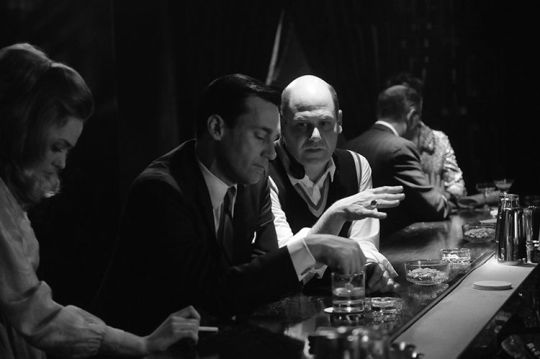
Born in 1965, Matthew Weiner is barely old enough to remember the period with which his television series Mad Men has now become almost synonymous. His office is exactly what one might hope for the creator of Don Draper: a stylish mixture of midcentury modern furniture, with a cabinet full of top-shelf liquor. But it turns out that the furniture came with the building, which was designed in 1955, and the liquor, mostly gifts, is wasted on Weiner, who hardly drinks at all.
(Copy and pasted cuz TPR charges and I got your back, man. Or maybe you’re made of money and can afford that kind of thing. It’s long in case ya wanna save it. Good Sunday night reading.)
Weiner’s sensibility reveals itself on closer inspection. A framed still from the set is shot from behind the actors’ heads, showing the crew. There’s a black-and-white photograph of Groucho Marx, Alice Cooper, and Marvin Hamlisch in conversation. There’s a homemade Father’s Day card by one of Weiner’s four sons, reading “Dad Men” in red and black crayon. There’s a picture of Stedman (Oprah’s boyfriend), because when Vanity Fair photographed Weiner’s desk soon after Oprah’s, he asked what she’d had on hers. His bookshelf overflows with fiction, essays, and poetry—from Diaries of Old Manhattan to Billy Collins to Moby-Dick.
A former Jeopardy! champion who once, rather than give notes, jumped up and danced to “Zou Bisou Bisou” for Jessica PareÌ (Megan Draper on the show), Weiner seems never to sleep. Our interview took place in four sessions that spanned almost eighteen months—real months, that is. More time than that passed on the show during the same period, but to say exactly how much would be, in Weiner’s universe, a spoiler. We spoke late into the night after he had spent full days in preproduction meetings, in editing, in sound-mixing sessions, on set, and in the writers’ room—and we could only sit down to talk on the rare nights when he didn’t have to write. Even with this schedule, he comes in every morning inspired by a movie he’s seen, an article he’s read, or a poem he’s remembered. (I’m lucky to be a writer on the show.) Weiner begins every season by rereading John Cheever’s preface to his Collected Stories: “A writer can be seen clumsily learning to walk, to tie his necktie, to make love, and to eat his peas off a fork. He appears much alone and determined to instruct himself.” The life of a showrunner leaves him almost no time to be alone, but Weiner seems always to be instructing himself.
WEINER
You know, I got a subscription to The Paris Review when I was fourteen or fifteen years old. I read those interviews all the time. They were really helpful.
INTERVIEWER
How did they help you?
WEINER
There were people talking about writing like it was a job, first of all. And then saying “I don’t know” a lot. It’s helpful, when you’re a kid, to hear someone saying “I don’t know.” Also, they were asking questions that I would’ve asked, only I’d have been embarrassed to ask them. Like, What time of day do you write?
INTERVIEWER
What time of day do you write?
WEINER
I write at night on this job because I have to, except Sundays when I write all day and all night. Left to my own devices I will always end up writing late at night, because I’m a procrastinator. But if there’s a deadline, I will write round the clock.
INTERVIEWER
Did you know when you were a kid that writing was the job you wanted?
WEINER
I wanted to be a writer, but the way my family thought of writers, that would have been like saying, I want to be quarterback of the football team or president of the United States. My parents had the books every Jewish family had—My Name Is Asher Lev, QB VII, O Jerusalem!—but they were also really into Joseph Heller, and my dad took Swann’s Way on every vacation. I always thought I would be a novelist, like the people whose books I saw lying around the house.
INTERVIEWER
Did you read those books?
WEINER
Not really. I read very slowly. I’m a good listener. If they’d had books on tape back then, I would be the best-read person in the world. When I had to do a report on Measure for Measure, I went and got the records, and I listened to John Gielgud do it. My dad read Mark Twain to us at night. I loved “The Stolen White Elephant” and “The Celebrated Jumping Frog of Calaveras County.” And The Prince and the Pauper, oh my God, did I love that. I read Mad magazine and stuff, but my parents were always yelling at me, You need to read more! Crack a book already! I was not really a reader until I left college. My favorite form of writing is still the short story. Winesburg, Ohio was the first book that I read where I recognized the people in it. I knew the teacher who was sort of gay and couldn’t control his hands. I recognized everybody in there. And then, with John Cheever, I recognized myself in the voice of the narrator. His voice sounds like the voice in my head—or what I wish it sounded like.
INTERVIEWER
Who are your favorite writers?
WEINER
I don’t make lists or rank writers. I can only say which ones are relevant to me. Salinger holds my attention, Yates holds my attention. John O’Hara doesn’t, I don’t know why—it’s the same environment, but he doesn’t. Cheever holds my attention more than any other writer. He is in every aspect of Mad Men, starting with the fact that Don lives in Ossining on Bullet Park Road—the children are ignored, people have talents they can’t capitalize on, everyone is selfish to some degree or in some kind of delusion. I have to say, Cheever’s stories work like TV episodes, where you don’t get to repeat information about the characters. He grabs you from the beginning.
Poems have always held my attention, but they’re denser and smaller. It’s funny because poetry is considered harder to read. It wasn’t harder for me. Close reading, that is. Milton, Chaucer, Dante—I could handle those for some reason, but not fiction. From ninth grade on, I wrote poetry compulsively, and pushed myself to do iambic pentameter and rhymes because free verse was cheating—anybody could do that. But I was such a terrible student. I couldn’t sustain anything.
INTERVIEWER
What pointed you toward drama?
WEINER
Actually, I think it has something to do with my not being a great reader. When a play’s put up, it’s all there in front of you. When you’re a little kid who has trouble with long books, it’s a very literary experience to go see Eugene O’Neill. During high school, I wrote skits, I did improv, I was a performer. My senior year in high school I was elected by my class to give a speech at graduation. It was seven or eight minutes of stand-up comedy, including a salute to the bottom fifth of the class, of which I was part. The dad of a classmate of mine, a guy named Allan Burns, who created The Mary Tyler Moore Show, came up to me afterward. He said, Have you ever thought about writing for TV? You could do that.
INTERVIEWER
Had you thought about it?
WEINER
I had been raised more or less without TV. I loved it, my parents loved it—but we weren’t allowed to watch it. And yet what was on TV during those years? M*A*S*H, The Mary Tyler Moore Show, Carol Burnett and Bob Newhart. TV was very bad before that, and got very bad after that, but at the time it was really very good. The thing is, I took what Allan Burns said seriously just because it was the first time someone said I might be able to do anything. But my parents hated show business. It’s part of living in Los Angeles.
There was one other formative experience. One of our English teachers, Ms. Moser, had a poet come to visit our school—W.S. Merwin. The honor society got to have dinner with him. Even though I made bad grades, I edited the literary magazine, and the teacher made sure I was allowed to go, too. She had even told him about me, because when we met he said, Tell me your name again, I want to remember it. In my yearbook, Ms. Moser wrote to me, Keep doing what you’re doing, and stick to poetry and starve.
INTERVIEWER
Which you did not do.
WEINER
I tried. At Wesleyan I could not get into any writing classes. I applied to everything and got rejected. You’re laughing now, you should have heard my parents. Six hundred students, all that money, and you can’t get into class!? An older student, who was studying with the famous professor Frank Reeve, told me I should go and ask, personally, to take a tutorial with him. Franklin D’Olier Reeve. This Vermont Yankee, log-splitting son of a bitch. He had gone with Robert Frost to Russia. Incredibly handsome and charismatic—in fact, he was Christopher Reeve’s father. I imagined he was in the CIA. So I went to his office and brought my poems with me. He shredded them. I had some line that was like, “Where does it hide?”—this is sophomore poetry, right?—“Where does it hide to gently squeeze the pitch of morning into orange whispers of dusk, squeeze the pitch of dusk into orange whispers of morning,” and he said, Lose the split infinitive and juice squeezer. It was brutal. Then he said, When do we start?
I spent three semesters studying with Professor Reeve, writing poems and delivering one or two of them to him every week. I also took a lot of poetry classes. There were a couple years there where The Waste Land was the most interesting thing in the world to me. I loved that it was so personal and grimy and gross and epic at the same time. Two women talking about getting an abortion in a bar at closing time right next to a story about Greek gods and the Fisher King. The high and the low together. It is so important to my life as a writer, there’s so much dialogue, so much rhythm that I have tried to emulate. That’s still my idea of what a poetic sentence sounds like. My senior thesis was in creative writing, was poetry.
INTERVIEWER
What were your poems like?
WEINER
Pretty funny, a lot of them, in an ironic way. And very confessional. A lot like what I do on Mad Men, actually—I don’t think people always realize the show is super personal, even though it’s set in the past. It was as if the admission of uncomfortable thoughts had already become my business on some level. I love awkwardness. Reeve compared my poems to cartoons. He had me read “Mac Flecknoe,” Dryden’s satire on the poet Thomas Shadwell, because he knew I had a sense of humor and was interested in celebrities. He also told me that I had to be as interesting as my work, which terrified me. I was like, Forget it, dude. I’m a very conventional person. I’m middle-class. My father’s a physician. I had no personality to speak of. I kept wishing I had grown up interesting so I could be a great writer.
INTERVIEWER
Maybe Reeve turned you into a TV writer by giving you a weekly deadline.
WEINER
I’ve always said TV writing is for people who hate being alone more than they hate writing. Even then I needed to talk about what I was doing. Once I knew that my writing would be read right away, even if it was judged—and once I knew that it would be shot right away—that was all I cared about.
INTERVIEWER
Did you figure this out in film school?
WEINER
No. I didn’t go to film school for writing, but I realized that if you could write, you could have complete control. All these people I admired—Woody Allen, Jim Brooks, Preston Sturges—directed and wrote. When directors would come to the school and talk about their movies, eventually they’d have to talk about the fact that someone else had written it. To me that was like the dirty secret.
Then I graduated from film school and was stuck in a hole by myself for three years, writing. Linda, my wife, was supporting us, but that was awful. I was not made for that. I am not the writer who wants to live in the woods. Plus, half my time was spent trying to get into show business, which is demoralizing and somehow futile without finished work, but easier than writing.
INTERVIEWER
What were you writing during that time?
WEINER
Screenplays. I finished a screenplay that I’d started at USC. Then I wrote another screenplay about paparazzi. Then I started working on a Big Movie. After film school, I read everything that had been assigned to me in college. I mean, everything. I read Mein Kampf. I read all the time instead of writing. And I read a lot of biographies and became interested in this kind of American picaresque character. By picaresque I don’t mean like Candide. I don’t mean a guy who shit’s happening to. I mean a guy who is making his own future because he has no other options. I mean Tom Jones. So I was writing this movie following a guy’s life from 1930 to the millennium. And I got to page 80 of the thing, and I abandoned it.
Then I decided I was going to make a movie, an improvised movie that I was going to be in. Kind of a comedy Cassavetes movie—people improvising, but in a story. This was around the time of Clerks. I saw Clerks and felt the way many people did. It wasn’t like hearing the Beatles for the first time. It was a ten-thousand-dollar amateur black-and-white movie. It was inspiring in the way only something crude and peculiar can be inspiring.
And because I had gone to film school, I knew what commercial filmmaking was and knew I didn’t like it. In the nineties there was a stranglehold of formula on the movies. People would point to great movies like Chinatown as examples of how structure generates great works. But I always felt that these structures were derived from great works. The individual stories are organic, they come out of people’s heads. To say that the story of Jesus and the story of Moses are the same story is a horrible mistake. Are they both heroic? Yes. Do they both have inauspicious beginnings and unmarked graves? Yes. That does not make them the same story. But the studios were trying to consolidate films into a bulletproof system, they were trying to reverse engineer a hit—which, of course, is insane. In entertainment you’re a fool to try that.
One of the big things was, everybody hated “episodic structure,” as they used to call it.
INTERVIEWER
Meaning what?
WEINER
They were uncomfortable with a movie like The Godfather or a story like the Odyssey, where the only thing holding the events together is the characters. Now, there’s this monster, this obstacle, but there’s no real progression—the hero just keeps trying to get home. Sure, Michael Corleone starts off as a young war hero and ends up as the godfather, but the wedding takes up the first half hour of the movie. People liked to talk about “act breaks” and “rising action” leading to a climax, but what about Apocalypse Now? Someone’s on a journey, and sure, we’re heading toward a climax, but there are so many digressions. To me, those digressions are the story.
People would say to me, What’s holding this together? Or, How is this moment related to the opening scene, or the problem you set up on page 15? I don’t know. That’s where the character went. That’s the story. So many movies in the seventies are told this way, episodically, and they feel more like real life because you don’t see the story clicking. Movies like Days of Heaven—big movies that take time out to show the locusts. Do you need the crop duster in North by Northwest? No, but it is the most memorable part of the movie. It has no essential function in the story. Cary Grant has already been pursued. They’ve already tried to kill him. They’ve drugged him. They’ve poured booze down his throat. Remember how Cary Grant goes back to the house where the bad guys got him at the beginning of the movie and poured booze down his throat? He comes back the next day and says, This is where I was, they poured booze down my throat. Remember how he goes into the room where they poured the booze into him and they’ve changed the couch?
INTERVIEWER
Even now the hair on my neck is standing up.
WEINER
They’re so evil. They changed the couch! It’s preposterous, but delightful. Of course, anything that is epic is episodic in structure, whether it’s Lawrence of Arabia or The Godfather, which was already being treated like an art movie—the most successful commercial movie in the world treated like an art-house movie.
I liked episodic structure and I thought it worked. I still think it works. At the time I was especially interested in Billy Wilder and Fellini. I liked their grasp of tone, the way the movies are both funny and dark. You’re always scared and laughing and on the verge of tears somewhere in the middle of these movies. I could watch Sunset Boulevard and 8 1⁄2 over and over again. Everything you need to know about writing is in those two movies. How to tell a story, where to start the story, whose point of view it’s from, at what point you leave their point of view, when you should see a character in a scene by himself or herself—all this shit that drives you nuts when you’re trying to structure something. And then, the fact that there are no rules. That’s what both movies are saying—there are no rules, the audience is not as rigid as you think, and certainly not as rigid as the people paying for the movies to get made.
Anyway, once I got out of film school I said, They will not let me fly the plane. So I’m going to build my own airport. I shot my first movie, What Do You Do All Day?, in twelve days, in 1995. It cost twelve thousand dollars. Anybody can raise twelve thousand dollars—now it would probably be even cheaper, because there was no digital then.
Around that time, my friend Daisy von Scherler Mayer called me up and said, I sold this sitcom. Come in and sit at the table. We’re going to run through the script and you’ll just pitch jokes. The show was called Party Girl. And I drove onto the Warner Brothers lot and sat down at the table with all these professional writers and had no trouble talking and telling jokes. Not just because I’m an extrovert, but because I’d just made this movie and I knew it was funny. You’ve never heard of What Do You Do All Day? and it never went anywhere, but I still say it changed my life. Making that movie took me from being a frustrated, bitter person with no control over his life to a delusional, grandiose person with no control over his life. I was so high on the idea of having a job and writing jokes and going down to the stage and seeing the actors saying them and getting laughs. I couldn’t believe it.
INTERVIEWER
So none of the screenplays you’d been writing before that period were made?
WEINER
Well, remember the eighty-page picaresque thing I threw away? That turned out to be the basis for Mad Men.
INTERVIEWER
Really?
WEINER
Four years after I’d started working in TV, I wrote the pilot for Mad Men. Three years after that, AMC wanted to make it. They asked me, What’s the next episode about? So I went looking through my notes. Now, imagine this. At this point it’s 2004—I’m writing for The Sopranos—and I go back to look at my notes from 1999 ... but then I find this unfinished screenplay from 1995, and on the last page it says “Ossining, 1960.” Five years after I’d abandoned that other screenplay, I’d started writing it again without even knowing it. Don Draper was the adult version of the hero in the movie. And there were all of these things in the movie that became part of the show—Don’s past, his rural poverty, the story I was telling about the United States, about who these people were. And when I say “these people,” I mean people like Lee Iacocca and Sam Walton, even Bill Clinton to some degree. I realized that these people who ran the country were all from these very dark backgrounds, which they had hidden, and that the self-transforming American hero, the Jay Gatsby or the talented Mr. Ripley, still existed. I once worked at a job where there was a guy who said he went to Harvard. Someone finally said, You did not go to Harvard—that guy didn’t go to Harvard! And everyone was like, Who cares? That went into the show.
How could it not matter, when everyone was fighting so hard to get into Harvard and it was supposed to change your life? And you could just lie about it? Guess what—in America, we say, Good for him! Good for him, for figuring it out.
INTERVIEWER
I’m struck by the irony that Don Draper has become an icon of the 1960s Establishment when the character himself feels like such an outsider.
WEINER
Everyone loves the Horatio Alger version of life. What they don’t realize is that these transformations begin in shame, because poverty feels shameful. It shouldn’t, but everyone who’s experienced it confirms this. Sometimes people say, I didn’t know we were poor—Don Draper knows he’s poor, very much in the model of Iacocca or Walton, who came out of the Great Depression, out of really humble beginnings. Or like Conrad Hilton, on the show. These men don’t take no for an answer, they build these big businesses, these empires, but really it’s all based on failure, insecurity, and an identity modeled on some abstract ideal of white power. I’ve always said this is a show about becoming white. That’s the definition of success in America—becoming a WASP. A WASP male.
The driving question for the series is, Who are we? When we talk about “we,” who is that? In the pilot, Pete Campbell has this line, “Adding money and education doesn’t take the rude edge out of people.” Sophisticated anti-Semitism. I overheard that line when I was a schoolteacher. The person, of course, didn’t know they were in the presence of a Jew. I was a ghost. Certain male artists like to show that they’re feminists as a way to get girls. That’s always seemed pimpy to me. I sympathize with feminism the same way I identify with gay people and with people of color, because I know what it’s like to look over the side of the fence and then to climb over the fence and to feel like you don’t belong, or be reminded at the worst moment that you don’t belong.
Take Rachel Menken, the department-store heiress in the first season of Mad Men. She’s part of what I call the nose-job generation. She’s assimilated. She probably doesn’t observe the Sabbath or any of these other things that her parents did. That generation had a hard time because they were trying desperately to be buttoned-down and preppy and—this is my parent’s generation—white as could be. They were embarrassed by their parents. This is the story of America, this assimilation. Because guess what, this guy Don has the same problems. He’s hiding his identity, too. That’s why Rachel Menken understands Don, because they’re both trying desperately to be white American males.
Of all of them, Peggy is my favorite. I identify with her struggle. She is so earnest and self-righteous and talented and smart, but dumb about personal things. She thinks she’s living the life of “we.” But she’s not. And every time she turns a corner, someone says, “You’re not part of ‘we.’ ” “But you all said ‘we’ the other day.” “Yes, we meant, ‘we white men.’ ”
INTERVIEWER
It’s strange that you wrote the hour-long drama Mad Men just when you were succeeding as a half-hour sitcom writer.
WEINER
I didn’t see a future in situation comedy. There wasn’t room anymore for something like M*A*S*H*, where they would have sentimental moments and episodes that could sneak up on you and make you cry.
When I started out, there were few dramas on TV. They were out of style. There were four news magazines a week, and there was Who Wants to Marry a Multi-Millionaire?, or whatever, and the procedurals and the game shows. Reality TV hadn’t happened yet. Then, while I was doing it, situation comedy went from being the most lucrative and exciting place to be in television to disappearing. All the things that people hate about network TV were starting to fail economically, and still the networks were asking, How do we re-create Friends? By the time I wrote the Mad Menpilot, the syndication market had dried up. Survivor happened when I was writing on the sitcom Becker. Survivor, The Sopranos, and Lost all happened within a few years of each other. By then, drama had become really big. And then David Chase hired me for The Sopranos based on my script for Mad Men.
INTERVIEWER
You worked on three seasons of The Sopranos before you went back to your Mad Men pilot. Did that change your conception of your show?
WEINER
Mad Men would have been some sort of crisp, soapy version of The West Wing if not for The Sopranos. Peggy would have been a climber. All the things that people thought were going to happen would have happened. Even though the pilot itself has a dark, strange quality, I didn’t know that that was what was good about it. I just wanted an excuse to exorcise my demons, to write a story about somebody who’s thirty-five years old, who has everything, and who is miserable.
The important thing, for me, was hearing the way David Chase indulged the subconscious. I learned not to question its communicative power. When you see somebody walking down a dark hallway, you know that they’re scared. We don’t have to explain that it’s scary. Why is this person walking down a dark hallway when he’s on his way to his kids’ school? Because he’s scared about someone telling him something bad about his kids. He’s worried about hearing something that will reflect badly on the way he’s raised his kids, which goes back to his own childhood. All that explanatory stuff, we never even talked about it. And I try not to talk about it here. Why did that happen? Why do you think? You can’t cheat and tell people what’s going on, because then they won’t enjoy it, even if they say they want it that way.
You know how sometimes I give you a note that says, Why don’t you do X? and you say, That’s the thing I wanted to do? That’s what I learned at The Sopranos. That’s the note I try to give to everyone who writes here. Take the risk of doing the extreme thing, the embarrassing thing, the thing that’s in your subconscious. Before The Sopranos, when someone said, Make it deeper, I didn’t know what they meant. Or really, I knew in my gut—but I also knew that it was the one thing that crossed my mind that I wasn’t going to do. To have Peggy come into Don’s office after he’s had the baby and ask for a raise and be rejected, and look at the baby presents, so we know she’s thinking about her own baby that she gave away, and then to have her tell Don, “You have everything and so much of it.” There is something embarrassing about that. A scene that was really just about her getting turned down for a raise became a scene about her whole life. That was the sort of thing I learned from working with David Chase.
Another thing that happened when I began writing on The Sopranos was I noticed that people were always telling me anecdotes. They would throw out a line of dialogue they’d heard somebody say or that someone had said to them—and that was the story. I did not know how important that shit was. There’s an episode where Beansie and Paulie are reminiscing and Tony dismissively says, “‘Remember when’ is the lowest form of conversation.” And it’s devastating. David Chase had witnessed that actual statement. Now I have a ton of stuff like that I’ve saved, things people have said to me that are concise and devastating and sum up some moment in their lives. When I’m talking to some woman on an airplane, and she says, I like being bad and going home and being good, that is very useful.
INTERVIEWER
Did you cultivate your memory for those moments?
WEINER
I always had that kind of memory, I just didn’t know there was any value in it. One time we were doing a research call at The Sopranos. It was a two-hour conference call with a guy talking about emergency medicine. At the end of it, the writer’s assistant, who was taking notes, had a bunch of medical facts, but all of us writers had written down the same two ideas. All of us. Just those same two ideas in two hours.
INTERVIEWER
What were they?
WEINER
He said that everyone with insurance is a VIP. And he used the expression “wallet biopsy.” I think they’re self-explanatory. But that’s what being a writer is. I don’t know what makes something a story, but I know one when I hear it. Mad Men was a show I wanted to see. I really wanted to tell a story about that period. I thought it was sexy. I wanted to live in it a little bit, and I wanted to remind people that they have a misconception about the past, any past.
INTERVIEWER
What sort of misconception?
WEINER
You know in Reds, when they’re interviewing the witnesses, and Henry Miller says, People today think they invented fucking? That kind of thing. The old people you’re looking at, they may have been more carnal than we are—drunker, less responsible, more violent. So many of those film noirs are about how soldiers reintegrate themselves into society. The private detective is haunted by the shadow of having killed people in the war. Don’t even get me started on The Best Years of Our Lives. The move to the suburbs, the privacy, the conservatism of the fifties—that’s all being driven by guys who, for two years, had not gone to the bathroom in privacy. I’m not the first TV person to be puzzled and fascinated by the fifties. The two biggest shows of the seventies are M*A*S*H* and Happy Days. Obviously that moment is some sort of touchstone for culture. Is Hawkeye not related to Don Draper? He’s an alcoholic Boy Scout who behaves badly all the time. I just wanted to go back and look again.
So I spent a lot of money buying videotapes to watch movies from the period. I hired somebody to do research for me. Then, because I was working all day, I stumbled on the idea of dictating. I found that I was constantly thinking of dialogue and couldn’t write it down fast enough. I heard that Billy Wilder did it, too. He walked around with a riding crop while his writing partners would type. Joseph Conrad did it. So did Henry James. I’ve since kept track because some of my writer friends think it’s cheating. And it’s hard to believe you can be as eloquent as your characters, but you can be if you have the topic and you’re channeling them. Then you get to fix it afterward. It’s way better than sitting there and procrastinating while you write a new piece of description and try to perfect the sentence.
INTERVIEWER
Will you describe how you write the show now?
WEINER
At the beginning of the season I dictate a lot of notes about the stories I’m interested in. Then for each episode, we start with a group-written story, an outline. When I read the outline, I rarely get a sense of what the story is. It has to be told to me. Then I go into a room with an assistant and I dictate the scenes, the entire script, page by page.
INTERVIEWER
I’ve seen you do whole scenes without pausing.
WEINER
I can see it in my head. And I don’t look at the dictation. I try and keep it in my head. That’s why the fatigue gets so bad. And why it’s crucial to have the right assistant. It requires the chemistry, it requires them reading my mind a little bit so they know when I’m moving back to an earlier person who’s talking or which person is saying it—because sometimes I stop identifying the speakers. After a while I’ll talk in different voices. I don’t even know what I’m doing when I walk around making up those scenes. But I wrote my play the same way, and my second movie, You Are Here. If you compose that way, it means the dialogue can all be said. John Slattery and I had an argument about something in the second episode, where there was a bit of a tongue twister. He was supposed to say, “Coop is going to want a carbon with your hand-picked team for Nixon on it. And I warn you right now, it includes Pete Campbell.” He said it was impossible to say, but I knew it could be said because I’d said it. I rattled it right off to him. Then he smiled and performed it and everything else I wrote for him. I started writing more tongue twisters for John. My favorite was, “He knows what that nut means to Utz and what Utz means to us.”
INTERVIEWER
What’s the main difference between writing for someone else’s show and writing for your own?
WEINER
It’s one thing to hear Tony Soprano say your dialogue. That is ridiculous. That’s a totally surreal experience. It’s another thing to create an entire environment and walk onto the set of this fake office from a different era and see Peggy in her ponytail and bangs and Joan looking like Joan. It was better than I could have imagined. I am a controlling person. I’m at odds with the world, and like most people I don’t have any control over what’s going to happen—I only have wishes and dreams. But to be in this environment where you actually control how things are going to work out, and who’s going to win, and what they’re going to learn, and who kisses who...
INTERVIEWER
And then you have the challenge of doing episode after episode, season after season. You once said to me, “I’ve written hundreds and hundreds of scenes with two people in them. You have to know what kind of scene it is.” What did you mean?
WEINER
When I was just starting out, a writer explained to me the meat and potatoes of situation comedy. For instance, a scene where one guy thinks he’s talking about one thing and the other guy thinks they’re talking about something else sounds like a big clicheÌ. But guess what? That’s comedy. The question is, Can you do it well? I’ve personally written some of the most clicheÌd comedy scenes on Mad Men.
INTERVIEWER
Like what?
WEINER
Like the first season, when Pete goes to return that chip-and-dip at the store. He tries to hit on the officious clerk and she rejects him, then that other guy comes in and hits on her, and she loves it. That could be a scene on any situation comedy in the world, right down to waiting in line. To me, waiting in line is one of the funniest things in the world.
Or think of the premiere of season 3 of Mad Men, where Ken and Pete both get promoted to head of accounts. I put them in the elevator so that each of them can magnanimously congratulate the loser. I wanted to see how long we could sustain the dramatic irony. When I got to The Sopranos, I realized that I hated it when one character would just help another character through the scene. “I got something to tell you.” “Well, uh, what have you got to tell me?” “It’s kind of hard to say, Ron.” “Well, I’m listening.” I don’t know about everybody else, but I find that whenever I really want to say something, there’s a huge obstacle. Except in this interview.
INTERVIEWER
What about all the scenes you do with four or five or six people? Or more? You have all those status meetings, all those partners’ meetings.
WEINER
Those are tough, and the hardest part of my job is dealing with exposition. So populating those meetings with a lot of characters gives you a chance to bury it. But I find that giving each of the characters their own goal in the scene helps them talk in my head. And that’s usually the place for the most drama. Characters go in the story from having a private problem to having a public problem, even if they just lie about it. Which I guess is some convoluted definition of dramatic irony. Take the meeting in the episode “Hands and Knees.” Don has almost been caught by the government. Pete has to turn down North American Aviation and lie for Don or Don will go to jail. Pete also knows that Don is sleeping with Dr. Faye. Lane has been beaten by his father with a cane. Roger has lost their biggest account and sent Joan alone to get an abortion. Joan has not gotten an abortion. And Cooper is just there—he doesn’t know anything. So there are six secrets in the room, and when I was writing that scene, the hardest part was forcing the characters to talk about anything. Luckily we had the structure of another dumb meeting. The audience has so much information, and the characters don’t have any.
In addition to writing, I happen to go to a lot of meetings, and I find them hilarious—the rules of order, old business, new business, it’s not just from the Marx Brothers. But you know, every scene is comic to me.
INTERVIEWER
The first time I walked onto the set, I saw a stack of mail sitting on a secretary’s desk. Every single letter was addressed to a character on the show, from a client they have in the show, stamped and postmarked 1965. How do you make it so real, so detailed?
WEINER
Well, I have a bunch of people who delight in re-creating that physical reality. But as for the writing, I don’t make any special effort to write “period.” I try to be realistic, but the characters are smarter and more eloquent than regular people. It’s part of why I have them talk so slowly—or, really, listen so much—because I didn’t want the dialogue to be repetitive and snappy and sound phony. I wanted there to be real things like people saying, What? when they didn’t understand something, and coughing—things like that. The director of the pilot wanted it to look “1950s.” He actually wanted to do it in black and white. Then he wanted it to be spoken faster. But if you speak that fast, you’ll have to keep repeating the information. I did not want to do that. I didn’t even have the characters address each other by name because it felt phony. And after two seasons of the show, Roger Sterling was known as “the white-haired guy.”
One thing we did agree on was that we were looking for a commercial cinematographic style. We were very interested in the ceilings, in the low angles. The cinematographer, director, production designer, and I all shared a point of reference in North by Northwest, which is a story about an advertising man. Even though it’s very stylized and it’s a thriller and it’s Cary Grant, it was made in 1958, a couple years before the pilot took place, and we were influenced photographically by that.
A lot of these things were decided, like so many good decisions, by financial necessity. In the pilot, I wrote an overhead shot of men coming into the Sterling Cooper building, because I knew that was the cheapest angle to make period. Looking straight down, you have the side of the building—and the buildings hadn’t aged much—and you have the tops of people’s hats, which might not require full costumes, and some cars, and you get the sensation of period. When we did the flashbacks, our first glimpse of Dick Whitman’s childhood, I remembered how, in Death of a Salesman, they had staged the flashbacks in the regular sets, and I thought, Why don’t we just put this in Don’s dining room? We’ll stage it in a sort of theatrical limbo.
INTERVIEWER
Often you’ll say, That just doesn’t sound period. And someone will go research it and discover that you’re right. How are you so connected to a period that you experienced only as a small child?
WEINER
I cut out any slang that I didn’t know organically. Even as a kid, you hear certain expressions and then you stop hearing them. I had heard people say, “Make a hash of it.” They don’t say it anymore. Also, I intuitively cast actors who had a certain formality to them. It turned out they were almost all from the Midwest. They have old-fashioned manners.
But you know, these questions of verisimilitude have a lot to do with the framing and the editing. The original director, Alan Taylor, is a huge fan of Wong Kar-wai, and so am I. What Wong Kar-wai does is let scenes develop in front of your eyes. In a conversation, the point-of-view shots will include parts of people’s shoulders and heads. He has a shot design that appreciates the space, puts the people in the space, puts the audience in the space. Music and mise-en-sceÌ€ne are part of it, but the editorial style was most important of all. We don’t use overlapping dialogue. Usually, when you cut a scene between two people talking, you keep cutting to the person who’s listening. It allows you to use material from different performances. It’s also supposed to keep the audience in the scene. But I felt that, since these actors were so good and they pulled off these transitions in front of our eyes, why cut away? So I’d stay with their performance. They would do the entire speech, and then there would be a pause on one side or the other for the other character to respond. That, to me, magically creates a first-person experience, though none of this was intellectual. That’s kind of the way I experience the world. It feels normal to me.
INTERVIEWER
Once you had directed the show, did it change the way you wrote for it?
WEINER
I try now to write every script as if I would have to direct it. I do not leave vagaries of position or gesture. I do not have vagaries about the set. I try to specify who the characters are. It’s a blueprint. I will always give visual clues. I’m not talking about the props only, but a visual motif. People sitting or standing. I will write those things in. Where they are in the room, I write that in the script. You don’t have to do that, and I used to not write that. Betty has a seat in the kitchen. That’s one of my things. Your mom has a place where she sits, if she sits. Directing has made me not write impossible crap like somebody “plops into a chair” or “turns beet red” or “rolls their eyes.” That means that there’s no cheating in the stage directions—“He’s never felt this way before.” “He reminds her of her father.” You can’t write how someone feels, you have to show it in the scene.
The miracle of writing Jon Hamm sitting on the steps at the end of the first season and, as the camera pulled away, seeing his face physically change in a way that . . . It was exhilarating. So much emotion. I’m too embarrassed a person to ever do that job. I don’t know how actors do it.
INTERVIEWER
On the level of the scene, you’re always searching for a surprising way into a moment, or a way that a moment can turn into something you don’t expect.
WEINER
You know that scene in Rebecca when Joan Fontaine is exploring the room where everything is monogrammed “Rebecca,” and George Sanders just appears in the window? It’s a ground-floor room, and he’s sitting in the window. He just slides his leg over the sash and walks into the room. You’re like, That guy could’ve come in through the front door, but I know so much about him because he came in the window. We all love moments like that.
How many people say at the beginning of a story that the character is bored, and they start telling all these things about how he’s bored—he does this, and he goes to his mom’s house, and she’s talking, and he’s staring off, and then you go to his job and it’s the same every day. But actually, it only takes one shot to explain to the audience that the character is bored, and I mean bored with everything in their whole life. They did it on The Sopranos. When Tony was supposed to be laying low, they had a shot of him on the escalator in the mall.
The story is not, We built this great bridge, let’s watch people go across the bridge. The story is, The bridge is out, the bridge is broken, I’m going to try to build one. And then it gets blown up right before I finish it.
INTERVIEWER
Do you read any of the commentary on Mad Men?
WEINER
I stay off the Internet.
INTERVIEWER
Now you do.
WEINER
Yeah, I couldn’t take it. It’s like being on trial for a crime you didn’t commit and having to listen to the testimony with a gag in your mouth. I did learn, though, that what I intended something to mean is not always what it means. That’s okay. It’s actually kind of amazing.
INTERVIEWER
You directed a movie last year. You write plays and poetry. How do you feel about being labeled a “TV writer”?
WEINER
I don’t even understand what that is. That’s going to be a big joke to everyone in ten years because everyone’s going to watch things on the same screen. The movie industry is clinging to its perceived role as the dominant form in the culture, but you know, I was just reading an interview with Stanley Kubrick from the late fifties where he talks about how movies, if they want to have any impact, have to start being more like television, or better. He was talking about the artists in TV at that time—among them, Woody Allen, Larry Gelbart, Neil Simon, Rod Serling, Paddy Chayefsky, Reginald Rose—and the directors who went with them—John Frankenheimer, Sidney Lumet, Delbert Mann. In the next ten years, they all went into the movies. The movies took that business away. But really, the fifties was the golden age of television.
INTERVIEWER
What made the fifties a golden age?
WEINER
Social consciousness and a respect for the audience. This was the same moment as the blacklist, so there was so much subversion. There’s poetry, there’s great speeches, there’s incredible eloquence in those early made-for-TV dramas, but they are derived from real life. There are actors in them who are unattractive. There are recognizable milieus, like automats. Before the 1950s, something like 12 Angry Men wouldn’t have seemed like a promising subject for a Hollywood movie. It had to be a ninety-minute TV show first. But that’s how it goes. Americans are subversive and they depend on their entertainment to express it. So thankfully, all subversive entertainment eventually succeeds.
INTERVIEWER
Do you ever worry about losing your touch?
WEINER
In show business, careers are always seen in terms of hot or cold. Hot and cold doesn’t interest me. That’s dependent on the world. Are you in style or are you not in style? My kids have no Faulkner on their reading list. Thomas Wolfe—completely gone. You never know what’s going to go and what will stay. But on the creative side, you’re either wet or dry. That’s what a writer asks himself. Am I going to dry up? The repetition is the hardest part. You know—you deal with it every day. You witness me trying not to get caught with my pants down doing something I’ve already done. Remember Allan Burns, from my high school graduation? Well, I had lunch with him after my freshman year of college. I asked him, How do you write? He said, My rule is quit when I’m hot. When I’m in the middle of something and it’s good and I know where it’s going to go, that’s where I stop, so when I get back tomorrow I can get back on it. Underneath this was obviously the fear that he could wake up tomorrow and not be able to write. That terrifies me, too.
INTERVIEWER
Do you have other superstitions about your work?
WEINER
I have a pen I use to check off numbers on the outline. I’ve been using that pen since Becker. I will borrow other people’s superstitions. But I’m most superstitious about hubris. I am terrified about having things taken away from me because I finally relax. When I wrote the pilot of Mad Men, I was saying, I’m already successful, why am I not happy? Now it’s become, You didn’t even know what success was. What if your dreams came true?
#Don Draper#Jon Hamm#Matthew Weiner#Mad Men#this is loooooong#hopefully some of you are into this#also if some of you versed in law tell me if this is legal? i give credit so i should be good right#right??
103 notes
·
View notes
Text
Crime
Playing With Power - When a mafia boss, Gerard, wins Frank in a poker game he sets out to be the first man to break Frank as his pet. But Frank is tougher than he looks and his pride refuses to back down. As their relationship unfolds their feelings for each other manifest into something much more dangerous - love. Trigger warning: This is an extremely dark story involving S&M and some non-con sex. 87k
Under the Hide of Me - Prohibition in New Jersey means mob bosses and bootleggers running hooch up and down the shore and into the city. Gerard Way, his brother, and their friend Ray are running an operation for the Capo Maranzano. Rival factions are trying to take over the business, and Frank Iero, from a prominent Mob family, is sent to them as their new driver. But the Ways and Ray are hiding two secrets: their own still on a farm in the Pine Barrens, and something darker yet. They’re werewolves. 18k
The Enigma’s Anomaly - Frank is a skilled assassin. He kills people for a living. He is not meant to fall in love with someone he’s been hired to kill. He’s supposed to just kill the guy and get it over with.If that’s the case then why is Gerard Way still alive? 146k
A Kiss on Bloody Lips - Frank stumbles on a serial killer that’s been terrorizing his city for weeks, and gets more than he bargained for when his obsession comes to a climax. 12k
Promises, Promises (Don’t Send Me Back In 30 Days) - “Sources on our investigative team say this was a bank robbery gone wrong, and that, when faced with a police task force surrounding the building, the suspect grabbed the nearest person and is now holding that young man at gunpoint as he makes his getaway.” 26k
Two Industrial Loads On Hot - Frank works the overnight shift at the laundromat, partially because it’s easier to push prescription painkillers on the side in the middle of the night, but mostly because there are fewer disapproving old people around to tattle on him for playing The Floor Is Lava on the washing machines. 3k
I keep thinking about this. There’s just something about it.
Public Enemy - In 1932, Gerard Way has been making a name for himself robbing banks up and down New Jersey. Frank Iero, analyst for J. Edgar Hoover’s Division of Investigation, is determined to catch him. 21k
I probably failed my math test today bc of this fic. I just stayed up reading this instead of studying. Whoops.
Point of No Return (not!fic) - So, have any of you seen that movie Point of No Return where Bridget Fonda is forced to be a government assassin after being busted for killing a cop while she was a drug addict in her misspent youth? And Gabriel Byrne (hello, yes please!) is her handler and Dermot Mulroney (before he got all skeevy) is her hotass photographer boyfriend? <1k
godspeed us to sea - His first thought is oh Jesus, it’s over already. He wonders if Gerard will even bother to bury him. i don’t know how long this is … maybe around 30k?
Mob! AU. I cried. Not that much gore tbh.
Everything in Your Eyes - Gerard's been part of super crime for the past five years, and he's never seen anything like this. A telepathic noir story. 5k
a must-read.
The FBI Gets Shit Done - A new series that’s like a cop show but with words.
Gerard, the boss, is an expert profiler and an easily irritated man at the head of a team that is dysfunctional and somehow functional at the same time. The arrival of newbie, Frank, is what sets the story in motion with the instant hatred instituted between Gerard and Frank. Their two styles of crime solving clash perfectly to make the team efficient and productive. However, the two men at each other’s throats may be a disguise for the feelings just below the surface. Three parts, 16k, 35k and 18k (70k in total)
Thicker Than Water - Frank used to be able to count the number of times he's killed for the Family on the fingers of one hand. That was years ago, but he'll always remember the first one. Gerard was daydreaming, and Frank had only just learnt how to use a gun. Frank was twelve years old. 1.9k
;_;
You Keep Me Sane - Gerard has become infatuated with a young librarian that had only spoken to him once before, and he realized that he didn't have the usual, unrelenting craving to kill. No, He had a different urge, one that seemed a little more dangerous... 144k
I read some of this before I started keeping track of read fics, so that’s why it hasn’t been on here until now. But aloooot more words have been written since 2016 (144k now. holy shit), and someone just reminded me abt it, so here’s to rereading!
Shook-Up World - Part 1 of the 1930s Dragverse series - Frank is just a kid when he discovers Gerard's secret, and it changes his life. When they meet again by chance years later, Frank's carrying around a few secrets of his own. 5k
On the Getaway Mile - Part 2 of the 1930s Dragverse series - It's the last year of Prohibition, and bootlegger Frank Iero wants to sever his ties to the world of organized crime and go straight, but his mob connections have other plans for him. No one would like to see Frank get away from the mob more than Gerard, but he's got problems of his own--like the fact that he's a cross-dressing cabaret singer constantly struggling to keep his true identity secret from those who can't be trusted. With the help of a devoted brother, a detective who just might be as trustworthy as he claims, and a wealthy, eccentric Scotsman who features prominently in Gerard's past, Frank and Gerard just might be able to get out and start a new life together, but it's not going to be easy.
A tale of gangsters, garter belts, love (hopefully) overcoming all obstacles, and a whole lot of coffee. 40k
Here’s the comment I left - not too spoiler-y I hope:
God, this fic needs a fucking movie. Also, I googled '30s halter gown' to better understand what Gerard was wearing and *waves fan* holy shit. No wonder G could jerk off at the thought of dresses. Now I want to re read the whole thing again and google all the outfits! Kudos to you, seriously, the amount of research that must have gone into writing this ... insane.
Like Fog on Glass - For Gerard, love can only come in the form of possession. If he is owned, he is loved--if he is sold, he becomes nothing. Untouchable in the eyes of the man, his Master, whom he held above all others.
For Frank, love is...enigmatic. Romantic. You can't buy it on street corners or in seedy bars on the outskirts of town. You can't steal it. You can't force it or kindle it from nothing. At least, you're not supposed to.
Love was certainly not what Frank expected to find when circumstances led him to spend his final $5k on a broken human being put up for auction on the bad side of town. Love...you didn't give that to creatures like Gerard. 111k
The Collision of Your Kiss - Gerard can hardly believe it when his new neighbor and latest obsession, Frank Iero, agrees to go out to dinner with him. It seems as though Gerard's dreams have come true, but he soon discovers that Frank's "hobby" is a little unconventional. Gerard still wants to be with him, though--if Frank's deadly secret doesn't put a wrench in their relationship. 4k
A Lap-Dance is so Much Better (When the Stripper is Crying) - Ray—and his ambiguously named friend ‘John’—force a depressed Frank to go the strip club downtown after he’s been broken up with. It’s a shame no one would listen to him when he insisted that this wasn’t just a strip club—it was a whore house. And no, he did not appreciate the lap-dance. 4k
Purgatorio - While on leave from the police force, Detective Frank Iero occupies himself with three things: drinking, brawling, and being alone. But when a series of brutal murders calls him back to active duty, he must find a killer while confronting people from his past, including estranged best friend turned businessman Mikey Way, and deal with his unwilling attraction to Mikey's enigmatic older brother Gerard. 27k
It’s been a while since i read this, but i remember it really good. It had such a mysterious vibe to it, and I loved how dark and gritty it was. Oh and Gerard makes really fucking cool metal sculptures in this one. ‘Twas awesome.
Rising With the Heat - "Bullet?" he says, voice high and confused.
"Um, hi?" Frank says, dropping to the ground.
"You're the one – have you been following me all week?" Gerard asks, slowly lowering the spray can.
Bob's going to give him so much shit for this. "I just wanted to make sure you got home safe." 2k
Frank is a superhero sidekick who’s fallen for Gerard, who he previously saved from getting mugged. Gerard finds it cute. And maybe a little bit hot.
2 notes
·
View notes
Note
(1/2) about the love to fanfic authors ask game! FAVORITE FIC would have to be a draw between the oihaba fic using the prompt: "Something about you makes me want to commit extreme violence," and the yahaba fic using the prompt: "just come back alive...okay?" because those were the first fics i'd read from you (the yahaba one went first and the oihaba fic followed) and after reading the oihaba fic i just fell in love with your writing and i knew i was gonna fucking follow you. FAV HEADCANON is-
{the "(1/2)" was a mistake! it's supposed to be (1/?)} (2/?) -that suga is an angelic little devil 'cos naughty suga is somthing i'm never going to get tired of reading and because it just surprisingly fits his personality so damn well. FAVORITE LINE would be: "A nod, and that overwhelmingly gorgeous grin directed at him again. “Exactly.”" from the bokuroo fill inspired by "I Just Can't Wait to Be King" and "A Whole New World" 'cos i felt so many emotions right then and there and that fic was-
(3/?) fucking beautiful and i just love bokuroo so much i could literally actually feel my heart swell with love and i smiled so much the entire time. FAVORITE SCENE would be: "If there’s anything that Tetsurou prides himself on, it’s knowing everything about the kingdom he lives in. He knows all the best places to hide and to relax, where to find the best food, and all the little out of the way spots that hardly anyone else ever bothers with. It comes in useful when Bokuto needs a night to get-
(4/?) -his mind off of his problems. Tetsurou sneaks into the castle as stealthy as the cats he shares the streets with, and he sneaks back out with Bokuto in tow, carefully avoiding prying eyes on the way. And it’s slow, but during their little adventure touring Tetsurou’s hidden gems, Bokuto’s mood lifts and his smile gets brighter, until Tetsurou catches himself staring at that instead of the stars above them." because once again my heart literally actually swelled and when i reread it-
(5/?) earlier it literally actually swelled again cardiologist help me. the scene was just really sweet, man, the entire fic was fucking gorgeous. my FAVORITE AU would be the aforementioned bokuroo "I Just Can't Wait to Be King" + "A Whole New World" fic but the AsaSouSuga (or whatever the hell the ship name was i can't remember" demon! AU is a close second. it was kinda hard to find a FAVORITE CANON fic 'cos all of your fics seem to be set in a time where they're older (post-canon if you will)-
(6/?) but that i interpreted as closest to canon was the TsukkiHina fic using the prompt: "Stop looking at me you smug heathen, you were right once." where it rained, made me feel a little something for the rarepair, and i like it :) FAVORITE CHARACTERIZATION would be "By the time that Lev and the rest of the team has cleaned up and gotten into stretching, Kuroo has finally finished his captain’s duties with the coaches, and he does his best to drape himself over Morisuke to look at the-
(7/?) -clipboard in his hands. On the floor next to their feet, Kenma snorts and continues stretching half heartedly, clearly already wanting to put his time to better use. Morisuke doesn’t have to look to know that Kuroo has that goofy grin on his face that means he thinks Kenma’s being cute, even though he’s not actually doing anything." because 1) yes kuroo would get in his lover's space just to piss them off because it's just him and he'd just play the card of paralyzed giant cat 'cos he CAN
(8/?) and 2) because i do feel like kenma does stretch half-heartedly too (seriously kenma bb stretch properly i sprained my own ankle yesterday cos my fuckass didn't stretch right :/) the entire fic was just fucking golden and fun and lighthearted banter and by the end of it i was cackling a noise akin to the sound of a herbivore being dragged to its water death by a crocodile (that's a compliment, by the way, i guess.) FAVORITE JOKE would be actual angelic suga striking again with:
(9/?) “You look a little stuck, babe.” Suga barely manages to quell the snickering to speak. “Cat got your tongue?” because yes actual angelic devil suga would say something as snide as that with a fucking cheshire-worthy grin can u tell i love angelic devil suga a lot anyway moving on. FAVORITE ONE-SHOT would be the kuroyaku "I will face God and walk backwards to hell" because i needed that herbivore-being-dragged-to-its-watery-death-by-a-crocodile laugh man. FAVORITE SAD BIT would be the fic
(10/?) about falling in love with their best friend’s partner au + AsaDaiTana because the burn of unrequited love was so fucking welcome because i like slow burning pain so much that was an exquisite kind of pain man 🥂 cheers 11/10 would hurt again. i don't really have a favorite series and i'm not really one to reread fics no matter how impacting they were because to me fics are a one time thing and reading them again loses its "love at first sight" kind of touch that i crave fanfics for tbh
(11/?) but honestly your writing is absolutely fantastic, your characterization's spot on and your portrayal of the relationships feels so real and actual and as a writer that takes a lot of skill to replicate and you my dude have that skill
(12/12) talk about you behind your back." and the goshihinatsukki + "things you said under the stars and in the grass" but when it boils down to it the oihaba and yahaba fic rightfully felt like my favorite fic from you, because you never really do get over that first love ;) i hope you had fun reading this 12-part thingie featuring my overuse of "and" and any other conjunction basically. (sorry for blowing up in your inbox but hey gotta do shit to let a writer know they're loved ily man
ahhhhhhhhhhhhhhhhhhhhhhhhhhhh i have been yelling since the very first message you sent, i cant believe you wanted to get so in depth im so honored and blessed and i might be crying a little bit. i just. im so amazed right now, im so happy and proud, im so so glad you like my stuff this much, it really makes me really emotional haha.
it means so much that you find my characterizations so good, and youve mentioned some of my favorite things that ive written, and im just. so amazed!!! i could answer each point but it would prolly take forever and if you want me to i can but i just love it all so much and im so happy. thank you so so so much! i doing mind so many messages at all nad im so happy you wanted to let me know. i love you so much thank youuuuuuu
2 notes
·
View notes
Text
Sunday Symbolism: Unhappy Childhoods make Great Nurses
CtM is a drama series, so it is only natural that the main cast have some drama going on in their private lives, or have had some drama. That being said, however, I did notice that the amount of past family drama for our favourite nuns and nurses is really high. I thought I’d write a post about it, gathering all those origins. It seems that unhappy childhoods make for great nurses and doctors ;). Is this really symbolism? I don’t think so, but it is just something that struck me.
Parents
Deceased or missing parent:
Shelagh: Shelagh lost her mother as a young child, leaving her with only her father (as far as we know, she has no siblings). This has greatly affected her childhood. It has also greatly affected her later life; if she had not felt Timothy Turner’s pain so keenly, it is probable we would not have had Turnadette. We don’t know too much about her childhood and how her father treated her, but one can imagine that it must have been difficult. I also guess that her father is no longer alive, because he’s never mentioned and we did not see him at the wedding (though some people have speculated that he might have been somewhat abusive, in which case it might be possible that he simply wasn’t invited even if he was still alive). Shelagh’s childhood remains an enigma.
Barbara: Just like Shelagh, Barbara lost her mother at a young age, too. We do know that Barbara is very close to her father, as we could see in the wonderful S06X08. Even though she grew up without a mother and had a father with a demanding job, it seems that Barbara enjoyed her childhood.
Timothy: Poor Timothy lost his mother to cancer when he was about nine. We can see the problems that arise because of this situation play out in season two: poor Doctor Turner does the best he can, but juggling a demanding job and the care for his son is often too much. Luckily for Timothy, there’s a sweet nun who is ready to take him under her wing ;).
Phyllis: Phyllis is a bit of the odd one out in this list-within-lists, because she did not lose her mother. Instead, she did not have a father, not because he died, but because her mother conceived Phyllis out of wedlock. Phyllis herself has mentioned how she admires her mother for working incredibly hard to give Phyllis a good start in life, even though society was hugely prejudiced against them. Phyllis’ childhood can’t have been easy, but it seems she and her mother tried to make the best of it.
Troubled relationship:
Chummy: It is no secret that Chummy’s mother felt ashamed of her too-large and clumsy daughter. There’s also the fact that Chummy was away at school for a large part of her childhood, meaning she actually saw little of her mother. They do manage to let go of some of their hurt feelings when Chummy’s mother is deadly ill, so that’s something, I suppose.
Trixie: Trixie’s father suffered from PTSD, caused by his experiences in WWII. Trixie tells Jenny that she felt responsible for her father’s well-being, and would act cheerful and silly in an effort to keep his demons at bay. During the fourth season, she also confesses to Sister Julienne that he was an alcoholic, though he himself claimed he had no problem. It is also suggested that Trixie’s mother expected her daughter to take care of her traumatised husband (Trixie says that her mother took care of her father during the nights, and that, during the day, “it was my turn”). This is something that should never ever be asked of a child, ever. All of this has had a huge impact on Beatrix: not only has it formed the way she behaves in general (always trying to be bubbly and funny), it has also shaped the way in which she deals with life’s less-appealing aspects (she has trouble expressing emotions that aren’t ‘happy’, and becomes an alcoholic herself because she doesn’t have a healthy outlet for those negative emotions).
Sister Monica-Joan: CtM is pretty clear on the fact that Sister Monica-Joan did not have a good relationship with her mother (Sister MJ confesses that she thinks it is cruel that she should miss her mother, because they had a hard time being in each other’s company). In the books, it also becomes clear that Sister MJ did not have a good relationship with her father; he was abusive and controlling and misused his power to hurt his wife. There’s also the fact that her entire family broke all contact when she decided to become a nun (in the books, it is told that they even locked Sister MJ in her room, refusing to let her out till she decided not to become a nun. Sister MJ managed to get her way by writing to the flipping queen of England, telling her of her plight, and only by some type of royal decree was she released and allowed to enter the novitiate). Yeah, Sister MJ and her family aren’t the greatest match (then again, she does visit her nephew and his family, so I guess time does heal some wounds).
Delia: I kind of struggled with putting Delia into this list, because her mother is mainly highly over-protective. This can be smothering and border on abusive behaviour, but we haven’t seen enough of Delia’s mum to say whether she really goes too far (what we’ve seen takes place after Delia has had a serious accident, and I can understand that a mother remains a bit overbearing even after several months).
Jane: in the TV-series, poor Jane was put into St. Mungo’s because her parents could not deal with her panic attacks. This can hardly have been beneficial for their relationship. Still, it is a great deal better than the books, in which Jane is the illegitimate child of a rich man and a maid, grows up in a poor house, and is horrifically abused there.
Jenny: Again, there’s no indication of this in the TV-Series, but in the book the midwife’s sister, written by Jenny’s sister Christine, it becomes clear that poor Jenny and Christine didn’t have the best of childhoods, either. Their parents divorced when their children were still quite young, and both remarried. Their partners were downright cruel to Jenny and Christine, ignoring them and forcing them to live like strangers in their own homes (there is one horrible incident in which her mother’s new husband smashes the lid of the piano down on Jenny’s fingers, because he doesn’t like it when she plays whilst he is home…)
Siblings
Cynthia: I can’t really say that Cynthia’s home situation was unfortunate (in fact, for all we know, she had a perfectly happy childhood), but there is one thing that was less than ideal: Cynthia had a handicapped brother. This must have been hard at times, and I think it must have been an important factor for Cynthia to get into nursing.
Sister Evangelina: apart from the fact that Sister E grew up quite poor, she also had a somewhat troublesome relation with one of her younger brothers. This guy had mental problems, and did not always receive the proper care (partly because he himself doesn’t seem to want it). This caused Sister E quite some sleepless nights.
As a side note: Trixie does have a kind of phobia for fish ever since her brother dropped her into a rock pool. This is the only time she mentions having a brother. I’m not sure if that’s an indication for her not having a good relationship with him after the incident, or whether we’re just working with the constraints of an hour-long period drama in which there’s no need for such a brother to be mentioned again ;).
Both
Patsy: Poor Patience Mount really tops everyone. She spent a part of her childhood in a prisoner-of-war camp, where she saw her mother and sister succumb to exhaustion, starvation, and tropical diseases. We do know that her father survived, but the experience scarred Patsy for life. This girl suffers from PTSD and has trouble expressing emotions, which becomes especially clear during the third and fourth season.
Unknown
Valerie: Not too strange, since this girl is the newest addition to the main cast. We do know that there’s a secret, but whether this relates to her childhood, her teenage years, or her time in the army is yet unknown.
Sister Winifred: Sister Winifred remains the enigma of CtM. I have high hopes for her in future series, though.
Sister Julienne: We don’t know anything about her childhood. The only thing we know is that she suffered through something similar as Sister Bernadette in Season Two, only she made a different choice: Sister Julienne was in love with a man, but felt that her calling was stronger, and decided to turn him down and become a nun instead.
Patrick Turner: I’ve put Patrick here, because we don’t know too much about his childhood. His ‘drama’ stems from WWII, in which he was traumatised and suffered a nervous breakdown. However, that happened when he already was an adult. I’d have to reread Doctor Turner’s case book to find out more, because even though a lot of things from that good read stuck with me, I can’t remember things about his childhood.
I can’t really say that all of these characters had unhappy childhoods (frankly, it depends on the person; you can suffer through a lot of hardships and still feel that your childhood was a happy one, and the reverse can also be true), but I thought it was something worth pointing out. I feel that this post has been a lot of aimless rambling; I’ll be back next week with something a bit more coherent, I promise ;)
26 notes
·
View notes